#another example of Christian not being the be all end all to being good
Explore tagged Tumblr posts
Text
Rundown of the more interesting parts from the Necrits live stream with Christian Linke (Creative Director and Co-Creator of Arcane) :
There was a longer version of the Caitvi sex scene but they got bonked by the ratings people, and because it would have raised Leagues rating to mature, it got brought down to what we got.
The entire Caitvi sex scene was directed and animated by Fortiche with zero input by Riot. Christian says, "That was French people being French."
Riot making Arcane canon didn't change where they were taking characters or the story, it just made them more aware of how it would affect other Riot projects.
Christian refused to confirm exactly when the events of Arcane take place in the existing timeline.
The Arcane doesn't originate from Hextech. It is just one - in universe - interpretation of magic.
Christian doesn't view Viktor and Jayce's love as romantic, and that romance wasn't the intention when writing their relationship. However, by the way he talks, it doesn't seem he's against people shipping them romantically - just as a creative team, they were more interested in exploring a close, complex male friendship / brotherhood.
The 250-million dollar show budget number is not accurate as marketing is included in that fund. Fortiche's goal from the beginning was to bring the level of animation found in feature animated films to serialised content. While the show was very expensive for an animated series, it was way cheaper than an animated feature film because they try and work efficiently. As an example, Christian says how often in Hollywood, it's not uncommon for sometimes 40-50% of what is animated to end up on the cutting room floor while with Fortiche they try and keep it around 5%
Ekko's hair was changed from a mohawk to dreads because the artist who worked on him told them that black hair doesn't work like that (in reference to the mohwak), and here's how it would actually work.
Legends of Runterra affected Arcane in terms of giving the team inspiration for how the everyday street life is for people in the regions.
Caitlyn's LOR Tactical design (2021) and Warwicks VGU Voicelines (2017) were made to reflect what was going to happen in Arcane - production of Arcane just took a long amount of time.
They've said from the beginning that the only person who could ever defeat Viktor at the height of his power was Viktor himself. His story is about the glorious evolution, the pursuit of that, and what it actually means to remove these human elements until there is nothing left.
All projects Riot is working on - whether the MMO, Games, Written or Animated projects - are in talks with one another at all times.
Christian comments on how very few games have remain in service as long as League has, and because of its ever growing and evolving story, it's hard to bring everything together cohesively since everything was made at different times, in different era's, by a multitude of different people. So, while many things may be very cool creatively, it makes it impossible to successfully bring it all together more often than not. So for new projects, they are more focused on making something good and successful with the team and talent they have, even if it retcons or replaces content made in the past.
Christian pitched singing Heimerdinger.
Arcane's scripts for S2 were locked in before S1 was released, so they were not impacted by fandoms or online reactions. Christian thinks maybe some animation choices were influenced by things the animators saw online, but not the story.
When watching the premier of the final arcane episodes in LA - the entire 4000 seat theatre cheered when Maddie died.
The butterfly motif shared between Jayce and Viktor specifically was used to represent transformation.
Christian talked about how they don't think about really whether people will like something or not, but whether it's the right consequence for the story (this is in discussion to Caitlyn losing an eye). What makes a character likeable to an audience in his eyes is their decisions in the story; the choices that they make.
Continuing on from this, he comments on how the choices Caitlyn makes now are so different now compared to the beginning of the show. She is now willing to take risks and sacrifice parts of herself for people, for Piltover and for what is right.
When asked about Caitlyn's signature hat, Christian says that the team saw it as somthing that didn't really fit this version of Caitlyn they were writing and the person she becomes and that's why it was never incorporated into her designs.
Back in the beginning, when they were first working on Arcane, Christian would constantly going back to Jinx and Vi's original design artists & Riot August who was their champion designer to make sure they weren't messing anything up with these characters.
Christian goes on to tell an anecdote of when Paul 'Zeronis' Kwon was drawing the first concepts for Vi. This was back when Christian was in music. She didn't have a name at the time, but when Christian looked over Paul's shoulder at the art, he comments "she kinda looks like a Violet to me." They never spoke about it, but months later, when she became a serious character concept internally, she was gifted the name Vi. To this day, Christian doesn't know if his comment resulted in her name or if it was just a coincidence, but Violet became stuck in Christian's brain as Vi's true name. Riot August (who was in chat) then confirms that her name came from her tattoo, which came from one of her key design elements, being that she had the number 6 on her face. So, just a happy coincidence.
Talking about the tattoo. The tattoo was shrunken in size so, from a distance, it would look more like a beauty mark and the brain can more easily disregard it. One of the many things that they had to think about when translating the designs over as, is animation, you would be looking at a characters face a lot more than you do in league where the camera is situated top down.
As they were wrapping up the stream, Christian talks about how there always needs to be a bit of space between what content creators / content consumers do (pointing at Necrit) and what Riot does. He thinks it's good that there is space for criticism and a critical view of the things Riot does. In order to succeed, he believes they need to listen to their audience but also that they need to have their own vision, take risks, and be bold. It's a delicate balance in his eyes, and projects tend to fail when these two sides are too in cahoots.
He iterates that they are not trying to shove anything down anyone's throats. They are just trying to find what makes these characters cool, tell their stories, and be true to the regions they come from. With taking the characters from League to Arcane, it was important that they translate these stories and characters so they can hold up with the best storytelling in the world.
This circles back to the earlier point about retconning things and replacing past stories and content. He comments on how some characters are very outdated or too archetypal, but they still have an essence that people love about them.
Arcane was something Christian worked on for 9 years, and he was getting clearly emotional near the end. He also adds they're just getting started and he wants to make sure they do a good job with this IP and the characters we really love.
To those who are not happy with certain decisions, he's sorry they didn't hit what you personally wanted, but there is simply no way they can please everybody. While they are trying to make as many of the Riot / Arcane audience happy, they as the creators and artists need to follow their own compass, be the shepherds of this IP; that being creative is hard. They will keep doing that even if they sometimes have to ruffle some feathers.
He closes the stream by confirming that they are investing quite a bit in Noxas, Ionia, and Demacia for the next regions they explore.
#had fun writing this out#made me actually watch the entire live stream and pay attention#league of legends#arcane#caitvi#jayvik#ekko arcane#warwick#caitlyn kiramman#jinx#vi#arcane vi#ekko#caitlyn#legends of runeterra#arcane jinx#arcane caitlyn
3K notes
·
View notes
Text
ORORUN REDRAW GUIDE !
i think we’ve all seen the atrocity that is genshin’s unreleased character, ororun. the entirety of natlan is a mess really, but as a yoruba person myself i CANNOT keep quiet about ororun specifically.
outside yoruba mythology, in yoruba, ‘Olorun’ (the name ororun is based on, pronounced o-law-roon , with o pronounced as in orange and the ‘roon’ pronounced shortly, not dragged on at all) is actually the same word we often use to refer to God in Christianity. Christianity is the primary religion among us yorubas so honestly, i was kinda glad they misspelled his name. it would feel SO disrespectful referring to whatever that thing is with the same word we use to refer to God who we actually worship. religion aside, genshin’s depiction of Olorun (cultural god, not Christian one) is downright disgusting. i’d never paid too much attention to genshin and its poor representation, but now that my culture has fallen victim to it, i completely understand all the outrage.
edit: please note that while we use ‘Olorun’ to refer to the Christian God, Olorun is just a general word for ‘god’ itself ! for example if i say “God in heaven” and “god of thunder” we know i’m referring to two different beings, in yoruba it’s the kind of the same—the same word is used to refer to both the Christian and other gods, but we know it’s different, even though olorun can be capitalized regardless of what god we’re talking about (unlike english where the Christian God is capitalized and other gods aren’t) at the end of the day though, when we say “olorun” even without context, we are usually referring to the christian God !
1. PLEASE DO NOT DRAW HIM WITH ANIMAL EARS !
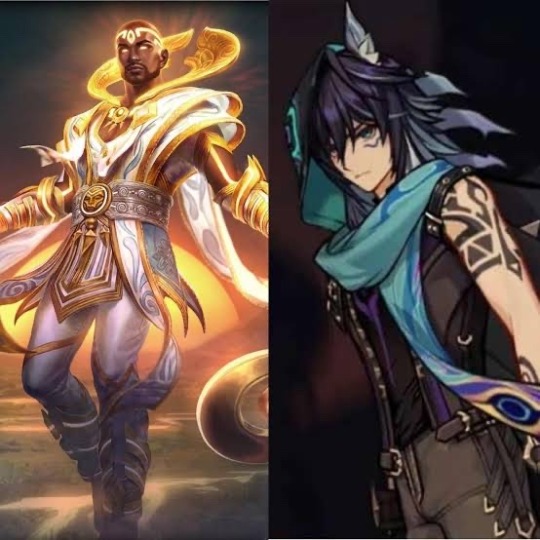
i’ve noticed that hoyoverse has this nasty habit of portraying every dark skinned character as wild or animal-esque. kaeya seems to be the only exception to this. even xinyan, though lacking any animal features, has this wild energy to her. some might call it a stretch, but i feel like her features are pretty feline in comparison to other liyue characters.
Olorun in our culture is the supreme god of the heavens. In my opinion, it is disrespectful to liken him to something akin to an animal. normally i wouldn’t even mind that much, but with how hoyo makes its few dark characters more and more like animals, i can’t help but feel weird about it. its really off putting.
2. HIS HAIR WOULD NOT BE CURLY !

majority of nigerians have 4C HAIR. not wavy hair or loose curls. some have 4B, but 4C is the usual here, that is, kinky or coily hair. Olorun is often portrayed as bald in traditional art, but trust me if he had hair his hair would resemble his people’s, not Tyla’s.
DREADLOCKS ARE A YES ! outside nigeria, locking hair is pretty common, but in nigeria a lot of people have locks naturally. our hair sometimes just grows out that way, no treatment no nothing. dreads are 100% an appropriate style, they look good asf too.
3. PLEASE USE CULTURAL FABRICS IN YOUR DESIGNS !
when i saw ororun’s outfit, i almost started crying. they couldn’t even bother to dress him up a little. they really dressed my brother in a scarf and cape and called it a day 😭 upon how fashionable we nigerians are know to be, hoyoverse still made it their mission to embarrass us stylistically. God knows my people have suffered man 😭
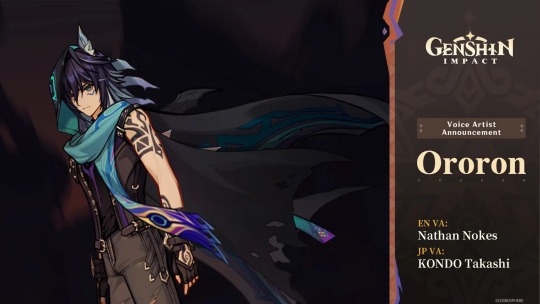
ankara is a traditional nigerian fabric that features bright colors and lots of patterned designs. see below:

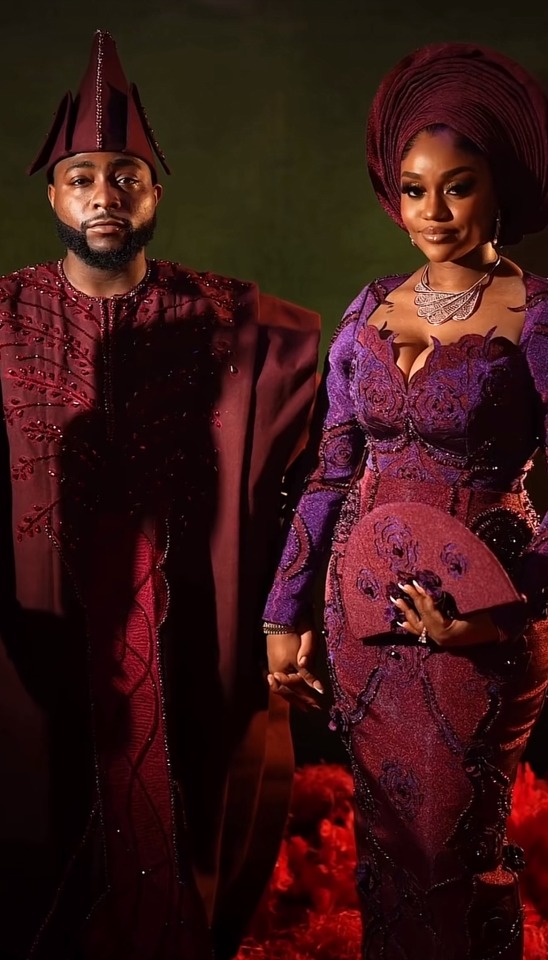

here in 9ja, we love our ankara. it’s a big part of our fashion here and trust me it would look excellent in your designs. it’s perfectly fine to draw ororun in normal fabrics since he’s a deity and it’s not like ankara existed back then, but if you really want to represent nigeria, ankara is a must 🙏
i’m going to address another fashion piece because if you search up nigerian fashion you’ll see it a lot: beads.

these orange beads are igbo (another tribe here in nigeria) NOT yoruba. does this mean you can’t use it in olorun’s design ? no ! let me explain. tbh, here in nigeria there’s a bit of...tension between clans. it’s not that common, but older people are definitely a lot more tribalist. as a yoruba i love my igbo brothers and sisters, i truly believe they’re the most fashionable clan and i adore their festivities, they always go over the top. please, just look at them:
(only one image because of image caps, ugh)
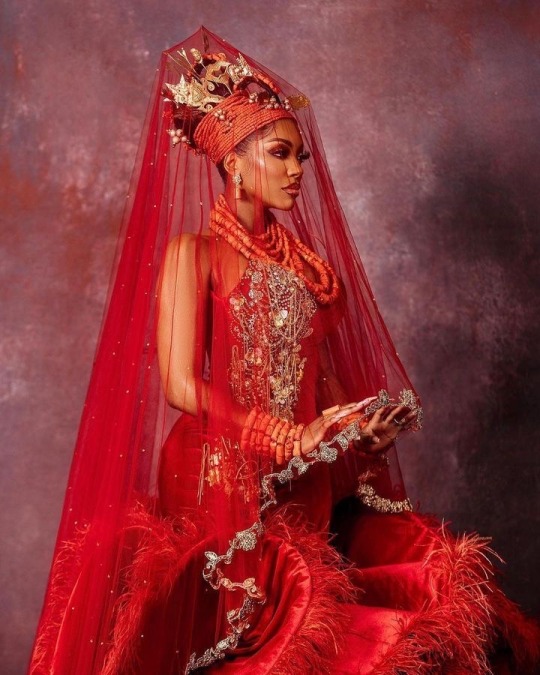
anyway, we yorubas wear beads too. but the specific way the beads are worn around the head and in multiple layers round the neck is igbo, not yoruba. though i personally wouldn’t care too much if i saw olorun with igbo beads since all i want is for him to at least look nigerian, at the end of the day he is a yoruba deity. it might be disrespectful to dress the god of one clan as if he belongs to another, especially since there is so much historical ( and very slight but uncommon present ) day tension between both clans.
here’s a more yoruba outfit. sorry yall, it might be hard for you to distinguish if you’re not yoruba or igbo, but a lot of nigerians can tell the difference at a glance. ( actually nowadays, there is so much overlap between yoruba and igbo fashion, but there are many specific styles that may be associated with one tribe and not the other, for example how beads are worn in the above paragraph ) please do your research, he’s not only a nigerian god, but a yoruba one.
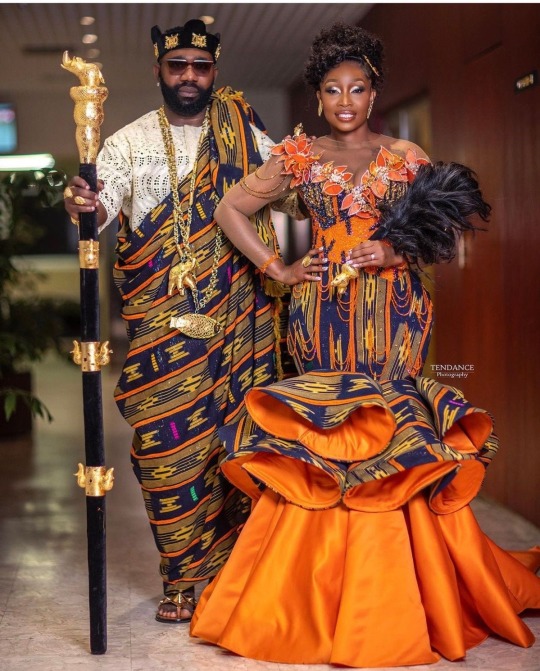
one more thing, because i know it will start discourse : skin tone.
nigerians have a very diverse range of skin tones. some of us are so pale, if not for our afrocentric features we could maybe pass for another race. however, ororun is yoruba.
light skinned nigerians are usually igbo. not to say that yorubas can’t be light skin, but here in nigeria if you saw a light skinned person, we’d automatically assume they were igbo. igbo people usually have lighter skin tones. majority of yorubas fall on the more milk to dark chocolate end of the skin tone spectrum. i’m saying this now because i know a lot of people are going to start arguments over ororun being redrawn as ‘too light’ or ‘too dark.’ i don’t really care about complexion, but i thought i’d help you all get your facts right.
that’s it ! if you read all this i’m super thankful. i don’t usually post about this kind of stuff but i honestly love my country and could go on about it for days. nigeria is such a beautiful place with a diverse range of cultures— from hausas to fulanis to so many more. natlan was supposed to be Africa’s time to shine, as well as latin americans, but hoyoverse said fuck you and your people. they did this to an extent with sumeru but natlan was done straight up dirty—not a single melanated character in sight, and the only one who does have melanin, iansan, looks so desaturated you might as well call her grey. i saw someone on tiktok call mualani a dark skinned character—it was at that point that i knew genshin was done for.
please REBLOG this post so it reaches more people and artists in the fandom !! this is literally the third time i’m making this post because tumblr refuses to show it in the tags for some reason 😭 i encourage other cultures who feel misrepresented to make posts like this too. it’s a perfect opportunity to educate and inform people about the diverse cultures genshin has once again failed to represent properly.
Hoyo has never been one to make customer satisfaction their top priority, but we’ve been able to call them out before and i truly believe we can do it again. Natlan is not poor design choice. it is blatant racism, a nation based on POC ethnicities with not a single colored character insight. Hoyoverse has been able to escape racism accusations for as long as i can remember, but natlan is the icing on the cake. we CANNOT allow hoyo to proceed as planned without giving them the appropriate backlash.
Also, if you redraw ororun using this guide, make sure to tag me here or on my main blog, @heartkaji !! i’d love to see all your redesigns. once again, thank you all for reading and have an amazing day !!
#REBLOG REBLOG REBLOG !#genshin#genshin impact#sumeru genshin#genshin sumeru#genshin natlan#natlan genshin#genshin oc#genshin fanfic#genshin fanart#genshin spoilers#genshin leaks#mihoyo#hoyoverse#genshin ororon#genshin kinich#kinich#mualani#mualani genshin#honkai star rail#honkai fanart#honkai sr#honkai impact 3rd#honkaiedit#hsr#hsr fanart#genshin redesign#sumeru#natlan#( 🛁— !! )
1K notes
·
View notes
Text
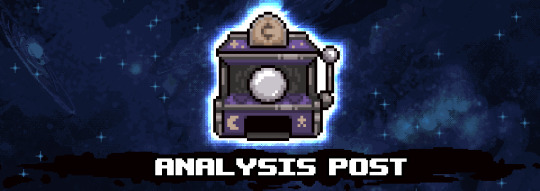
the binding of isaac is an incredibly detail oriented game when it's looked at closely. while a lot of observations about isaac could simply be gleamed from the game's endings, it is the items and interactions in the game that showcase the true complexities of his character - one of these interactions being the fortune teller machines (or more accurately the "fortunes" they provide). these fortunes are indicative of things that isaac considers good, real, or otherwise truthful remarks, and reflect things that he's been told in his real life.
the fortunes themselves are presented as instructions or insights to the reader, and are often cynical or downright hurtful in nature, though not necessarily presented as such. they're shown just the same as other generally kinder remarks - fortunes like "BLAME NOBODY BUT YOURSELF" and "YOU WERE BORN WRONG" exist alongside fortunes like "YOU MAKE MISTAKES IT IS ONLY NATURAL" and "BELIEVE IN YOURSELF". this lack of distinction between these wildly different perspectives displays the kind of information he gets about himself, likely mostly coming from the two biggest sources of information in his life - his mother and father. isaac sees both perspectives as completely valid, because they're both people he was raised to trust, and isaac himself is still too young to really question their remarks towards them, even if they seem paradoxical. isaac also seems to take great importance in the sources his mother provides through her christianity, such as television or literature. the fortunes that are biblical (and often crueler) in nature likely come from there.
in a similar vein, many of the fortunes contradict themselves on their own advice - "WAKE UP" and "STAY ASLEEP", "GO OUTSIDE" and "DON'T LEAVE THE HOUSE TODAY", "MARRY AND REPRODUCE" and "QUESTION AUTHORITY". these fortunes and their simultaneous existence, while also showing the kinds of contradicting information he receives, could also portray a frustration or confusion with the statements themselves. he feels as though it is all true, but he can't possibly fulfill it all without compromising some part of what he was brought up with. it reflects a central theme of the binding of isaac - isaac's struggle with morality, with trying to understand what is the "right" thing for him to do, or if he is even "right" in the first place.
isaac struggling to see himself as "right" likely comes from many of these comments being more self deprecating than they are kind. considering their portrayal as just as accurate and true as any other fortune, remarks like "YOU LOOK FAT YOU SHOULD EXERCISE MORE" and "YOU WILL NEVER BE FORGIVEN" are taken at face value, and their depiction in game displays the way isaac sees himself and how the way people around him describe him is taken to heart. he sees himself as a monster, and it seeps down into every part of his being.
there are also fortunes that break away from the game itself and express isaac's vague awareness of the current state he's in. a lot of them refer to his own death or sleeping (one even refers to steven - which i intend to elaborate on later), and the only fortune that is a referral to isaac himself is "I FEEL ASLEEP!!!" *. its existence as the only fortune that actually talks about himself is yet another example of the small moments in which the binding of isaac's facade slips and he can, briefly, see his own fate.
some of these fortunes aren't always completely isaac's own thoughts, of course. there are quite a few fortunes that are meta in nature, like "REBIRTH GOT CANCELLED", "WELL THAT WAS WORTHLESS", and "WHEN LIFE GIVES YOU LEMONS REROLL!", and these obviously aren't always indicative of his own thoughts or views on his life. by and large, however, these fortunes are signs of the way isaac sees himself and the things he's been told from their contradictory, personalized nature, and their imperative structure with a second-person perspective.
* i realize that this is likely a reference to metal gear solid. i still feel like the way it is written fits within the context of the game / character and can be analyzed as such without a simple meta dismissal as some other similar references.

thank you for reading! i hope this one wasn't too wordy! i love feedback or continuing the discussion, so please feel free to comment or reblog with your thoughts. it made me so happy to see how much people liked the first one i did, and even happier to hear everyone's thoughts on it.
i have one more analysis post planned about steven and isaac's connections, and might write more if i get inspired. :-)
#PEARL - AQUAMARINE#tboi#the binding of isaac#isaac moriah#ANOTHER OOONEEEE!!! I STILL GOT IT#maybeeee i should stop posting these at midnight...#But i don't want to.#the format isnt exactly apa or mla but i wanted to do this for readability lol
83 notes
·
View notes
Text
Dead Gods in Mythology
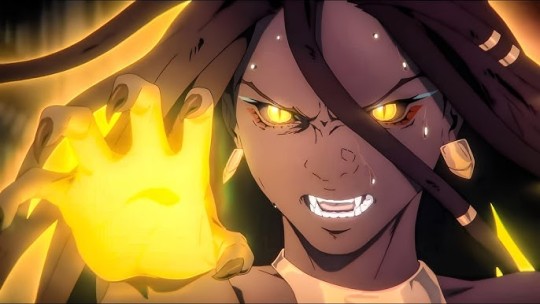
Okay, another little write up that has been requested. (Note, yes, you can send me requests for mythological and historical contexts. I love talking about this stuff. Just send a DM or Ask, and I will see to it when I get time.)
This came from a discussion about Sekhmet in season 2 in Nocturne, where someone brought up: "Well, she cannot really have been a goddess if she died." And of course I had to go: "Well, actually..." At this. It ended with me promising a write up on this.
See, this is an idea that is prevasive in western culture, and gets brought up again and again in media: Gods don't bleed, and gods don't die. It has been brought up in The Road to El Dorado, The Epic Musical, and in Kaos. But this idea is actually mainly rooted in - drum roll please - Christianity of course. With the Christian God being a single god, who is supposed to be all mighty and eternal. Polytheistic cultures meanwhile tend to have a couple of gods who within the mythology die. Sure, some of them are revived by some sort of magic - or continue to exist in another plane (in those cases often becoming the guardians of some sort of plane of the dead, where all dead souls go) - but yes, the polytheistic mythologies that we know off tend to have at least one god who dies.
So, let's talk about some of them.
Ra
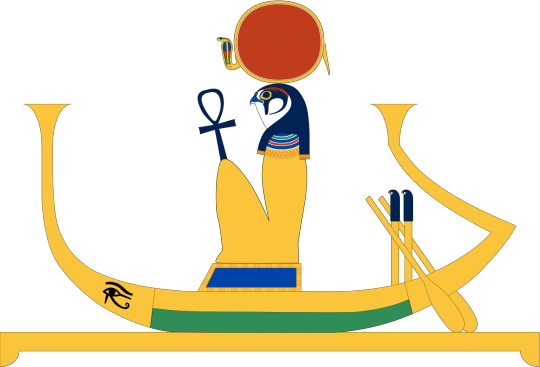
Given our starting point is Sekhmet, let's start with the Egyptian mythology. Here we have two big examples of gods that prominently die.
One example of this is obviously Ra. Ra's entire thing is that he does not only die in the mythology, but that he dies ONCE A DAY, which was the Egyptian mythology's explanation for why there is night and day. Ra dies at the end of the day, and he moved through the duat during the night. This is in fact part of the reason why we know so many details about the duat, as those are described in several mythological texts about Ra's journey through the world of the dead.
Of course, this might be strange example, because Ra obviously gets revived daily, too, but that does not change the fact that he dies once a day. And for a good chunk of Egyptian history (please keep in mind that Egyptian religion shifted during the 3000 years that Ancient Egypt was around) Ra was one of the most powerful gods in their pantheon so to speak.
Osiris
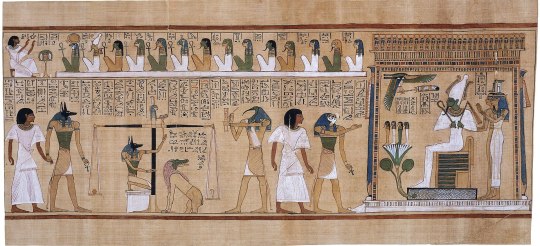
Then Egyptian mythology has probably one of the best known examples of a god getting killed. And that is Osiris. Like almost all of the old mythologies, the Egyptian deities were a lot into siblings marrying. And in Egyptian mythology there were noticable four siblings: Osiris, Isis, Seth and Nephthys - the latter getting usually ignored by modern audiences for some reason.
Osiris married Isis, Seth married Nephthys. And of course, as it goes with godly siblings, Osiris and Seth had a lot of quarelling and rivalry going. Seth - of course - being a god of the desert and chaos. And eventually Seth manages to trap Osiris and kill him. Now, the details of this have shifted once more throughout Egyptian history. In some variations they aphyxiate him, in others Osiris gets hacked into 26 pieces. One way or another, Isis will look for her dead brother-husband, find his corpse or his corpse parts, revive him, get pregnant with Horus, and then they find out that because he was dead he has to become now the god of the dead, being turned into the god overseeing the souls moving into the afterlife.
Baldr
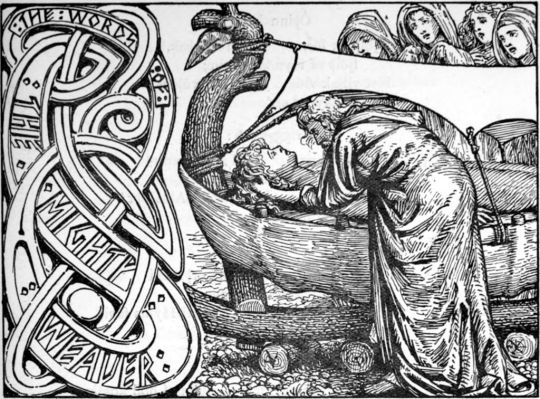
Then there is of course the myth of Baldr in Norse mythology. Another son of Odin and Frigg. And it was said that Baldr was the most beautiful of all the gods. And Frigg loved him so much, that she went around the world and made everything - every stone, every animal and every plant - promise that they would never hurt him. However, she did not get to ask the mistletoe, and Loki noticed this. And being the trickster that he is, he devised a plan. He tricks the blind god Höðr to shoot a mistletoe arrow at Baldr, which then obviously kills him. In the prose Edda this is the reason for Loki's punishment with the acid spitting serpent.
Baldr of course moves onto Hella - the place, not the goddess - and remains there.
It should be noted of course that in the Edda we also know that most of the gods eventually die during Ragnarök. Though this is also where we should note, that the Edda are of course a source that we should use with some care, given that it is not a first hand account by Norse people, but was written up by Christian monks. (Most notable, a lot of researchers doubt by now that Loki ever was an actual god in Norse mythology, but was invented by Christians to fill the roll of a satan-like figure.)
Zagreus
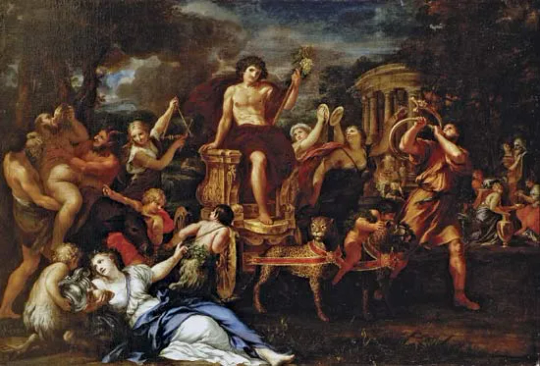
Where are my Hades peeps at? If you have played Hades, you obviously know that Zagreus has this habit of dying and coming back. And this game mechanic is actually based in mythology.
And this is the moment where we should speak about one important fact: We tend to act as if we know everything there is to know about Greek mythology, but actually we do not know this. We know a lot about the most important gods, because we have several written sources about this - but when it comes to smaller or local gods, we absolutely are loosely informed, given we often only have text fragments. At times several text fragments that are contradictory. Zagreus is one of these.
Zagreus is either an alternative name for Dionysus, the son of Zeus and Persephone, or the son of Hades. The latter aspect has been tried to explain by researchers with the fact that we are not sure if the three big gods (Zeus, Poseidon, and Hades) were always distinct entities or might have been for a long while different aspects of the same god.
One way or another: We have at least two different text fragments, in which Zagreus dies. Once he gets murdered by Titans, once he dies in an accident. One way or another he dies. And in the cases where he is a son of Zeus, this seems to be the explanation why he is bound to the Underworld.
The Hades game kinda mixed and matched with the mythology there xD
Lugh
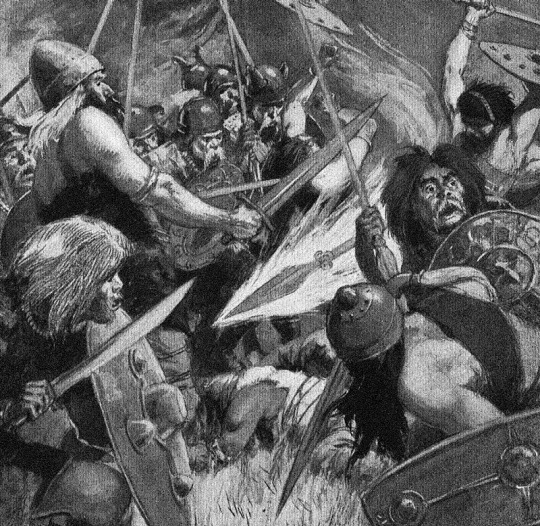
There I go again, talking about another mythology that we are actually not quite as certain about as some people seem to believe we are: Gaelic mythology. Once more, our issue is that while some of this was written down, it was written down after the region had been Christianized, so there is a lot of Christian bias in those texts. In fact it is even more clear in this example, given that the written down accounts of the Gaelic mythology involve references to biblical events. And of course the Tuatha de Danann are in the written down accounts references more as amazing humans, rather than gods - though we are fairly certain they originally were deities, with Lugh in particilar being a god of justice and war.
In the variations of the story we know, Lugh kills another god named Carmait, as that other god had fucked one of Lugh's wives. And in revenge Carmait's sons end up killing Lugh, by spearing him on his own magic spear and then throwing him into one of the Lochs. So, yes, if you count, this story in fact involves two dead gods. Generally speaking, quite a few of the Tuatha de Danann end up dead, though, again, I will point out, that we are not fully sure how much of this is routed in the fact that these myths were recorded by later Christians, who might have wanted to make sure that everyone understands that the Tuatha de Danann were not actually gods.
Izanami
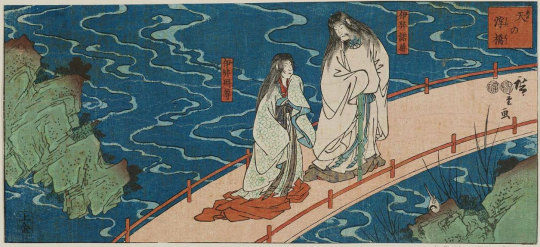
Technically we actually have a variety of Shinto gods (aka kami) who die. But I will focus maybe on the most widely known story, that pretty much everyone who ever played Persona might be aware of: Izanami. And if I recount the tale, you might in fact feel strangely reminded of other myths.
Izanami and Izanagi were the first kami that were created, and they created the land, and then the world around it, through the act of procreation with one another. Eventually Izanami gives birth to the fire god Kagu-tsuchi and he burns her to death. Her remains are buried, but the grief-stricken Izanagi cannot be without her. So he travels to the underworld, Yomi. Eventually he finds Izanami, but she tells him that she can no longer leave the underworld, as she has already eaten from the food of the underworld. He tries to convince her, but eventually he sees her face and realized that she has the face of death, and flees in terror. She gets angry at this, and curses him and the land of the living, before she remains in Yomi as the goddess of the dead.
Vritra
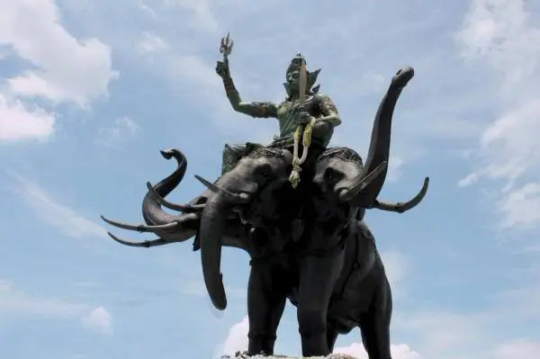
Vritra in Hindu mythology is one of the danava and serves as the personification of drought. In the mythology he once tries to block a river, of course with this causing a drought. The other gods cannot stand by this, and Indra, who sees Vritra as his nemesis, ends up slaying Vritra to stop the drought.
Note, here, too, that there are a couple of deities in Hinduism - as well as the religions that sprung off of Hinduism - that die at least for a shorter while.
If you have ever had the fun of talking to one of the very annoying atheists, you might have heard someone pointing out that Krishna dies and is resurrected in a way that is quite similar to Jesus. Because, yes, this general mythological concept is assumed to probably go back to the progenitor religion of the Indo-European cultures. While we do not know anything about that religion (because back then nobody wrote anything), anthropologists and comparative mythology researchers are fairly sure that there was a tale of a god dying and returning from the dead in that religion as well, which is why it shows up so often in religions of that cultural sphere.
Innana & Dumuzid
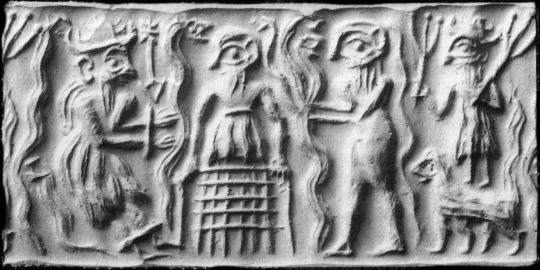
Now let's talk about another really old mythology, about which we know surprisingly much, because they have written a lot down - and we were able to translate it. And that is the ancient Sumerian mythology, in which we have Innana or Ishtar (who in Egyptian mythology later became Isis). Again, due to these also being within the realm of the Indo-European mythologies, you will find some similarities - though in comparison to other goddesses in the same role, Innana is a lot more proactive.
Innana is convinced by her brother to marry the shepard god Dumuzid, though it is fairly clear through the poems we have, that she and her husband never quite saw eye to eye. This makes her death also quite interesting. Because Innana dies by her own volition, because her sister Ereshkigal, who was made the goddess of the dead, misuses her position. So Innana dies to be able to travel to the Underworld and fight Ereshkigal to dethrone her. Enki at this point helps Innana to flee the Underworld and return to the world of the living. However, there needs to be balance in the world. So if she returns to the world of a living, someone else needs to take her place in the Underworld.
As she returns to the world of the living, she sees her servants having mourned her, while her husband, Dumuzid, just instantly went: "I am a widower? Sweet! I can fuck around with servant girls now!" And as we say: Fuck around and find out. So Innana goes: "That asshole has not even the decency to act as if he is mourning me!" So he tells the spirits of the Underworld to take him to take her place. And so they do and kill him.
Good for her!
Quetzacóatl
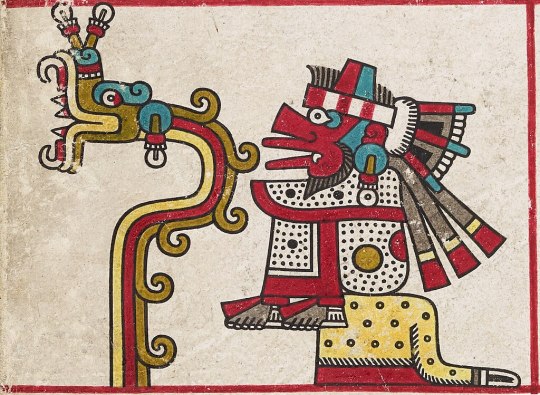
The very attentive of you might have noticed that all myths I have talked about so far (with the exception of Izanami, where anthropologists and comparative mythology people are still arguing about whether or not there was an influence there - mind you, I land very much on the side of "Yes, obviously, there is an Indo-European influence to Shinto-Myth!") are from the Indo-European influence sphere. So let's lastly talk about one other god, who just so happens to be probably important for Castlevania Nocturne as well: Quetzacóatl. Now, historians researching the Nahua, are fairly certain that this myth has come to be because there once was a Nahua ruler named Quetzacóatl after the deity, and that ruler died, which then in mythology got mixed up with the deity. Never the less: There definitely is written down myths about the death of Quetzacoatl.
The short of it is, that a couple of demons plotted to kill him, but knowing that they could not kill a god, they deviced a plan: They would feed him a beer that would drive him mad. While it took a lot of trickery, they succeeded, and drove the god mad, making him commit suicide by burning himself alive.
Maui
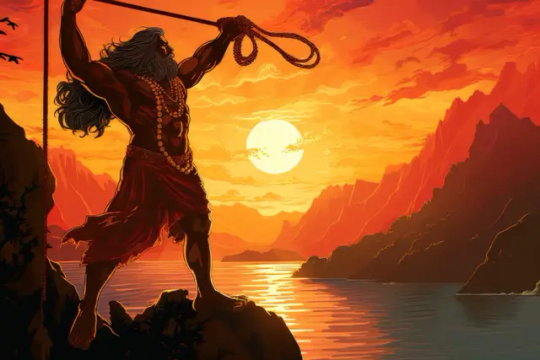
Okay, I know what some might say: "But actually is Maui a god?" I will answer: "That depends who you ask." Maui is a character that shows up throughout almost all the Pacifica cultures. He is always a trickster and a culture hero. At times he is a mortal, at other times he is a demi-god, and at yet other times he is a full god. Because those cultures were distant enough to have the myths shift around. So yes, maybe you will call this cheating. But fuck it, let me talk about Maui, because I kinda think his death is pretty darn cool.
So, if you have watched Moana, you know that Maui is a shape shifter. And he was very fond of humans. So, he decided that he wanted to make humanity immortal. His plan to do so was to go to the goddess of the Underworld and death, Hine-nui-te-pō, and reverse the birth by transforming into a worm and crawl into her vagina. However, she woke, and it turns out that her vagina had teeth - so she crushed him with her vagina teeth. Which is... pretty darn badass, I would say.
Lastly
Let me end this entire thing with the note that there probably are quite a few more gods that die within their respective mythologies. I know at least of two myths from North America in which Coyote dies (a lot of North American cultures have Coyote as a trickster god). And I personally am simply not well informed on South American mythologies or a lot of African mythologies. I do not know stuff about the Indigenous pre-buddhist mythologies of Southeastern Asia, and central Asia. So there is a good chance that there are gods that die - or die and get resurrected in those mythologies - but if there are, I simply do not know enough about them.
Generally speaking though: Gods rarely can be killed by normal mortals. Mortal half-gods might succeed at times. But other gods? Yeah, they sure can kill their fellow deities. And some deities also commit suicide to save other people. It is a common thing throughout mythology.
So, please, can we just stop claiming gods are truly immortal? They will usually not die of old age or anything like that, but they very much can be killed by other gods, magical weapons and such things.
#castlevania#castlevania netflix#castlevania nocturne#mythology#religion#norse mythology#egyptian mythology#greek mythology#japanese mythology#nahual mythology#sekhmet#izanami#celtic mythology#gaelic mythology#lugh#osiris#ra#hades#zagreus
124 notes
·
View notes
Text

Fangs of Fortune: The Game of Yin and Yang
I love how Zhao Yuanzhou is basically embodying the philosophy of Yin and Yang, which is much more flexible and practical than the old-fashioned Christianity-inspired good vs. evil dichotomy.
And because it is Chinese philosophy, we don't get too much of that black-and-white nonsense in the show, but instead, we get to explore 50,000 shades of black, white, and gray playing with each other beautifully. And what better way to convey the ambiguous nature of this world, which seems so bent on the Duality of literally everything, than to take the Evilest Force in the world and attach the most gentle, caring, and loving soul to it (to torment both that soul and everyone who gets to witness this torment).
I mean, the recipe is nearly perfect, it really is. And not only do we get to see this evil mixed with a hefty portion of good (like that drop of white inside the Yin-Yang symbol), but we also get to see the perfectly good and innocent characters mixed with a hefty drop of black (like Bai Jiu who got possessed by Li Lun).
Children are considered by society as the most innocent creatures (okay, Bai Jiu is a teenager, but he could still pass), that's why getting him taken over by someone so dark and broody and ill-intended like Li Lun hits even harder. Like all that innocence becomes tainted by something so bad. And at the same time, being a supposedly innocent child, we also see that Bai Jiu really isn't stainless himself (and he got to explore a bit of his darker side when he betrayed his friends).




And yet, it is also Li Lun, who is not someone abysmally bad (he's just lost, and wounded, and a bit more on the demonic spectrum when it comes to ethics and morality), who gets attracted to that light and purity to get a chance at redemption (which he does get in the end!). It's as if being in that body, chatting with those people, experiencing some friendliness before he got exposed actually mattered to the point that it changed him as well (and thus, that droplet of light in the blackness of Yin started doing its magic, slowly transforming the darkness, giving hope to someone who has seemingly lost it).


There's also Zhuo Yichen and his ability to see the good for what it is and his inability to see evil where there is none. Like, if it was someone else (even in real life probably) they would righteously hate Zhao Yuanzhou no matter what (maybe even knowing that he had no choice but to kill all those people). But this young man not only sees the good in Zhao Yuanzhou, that droplet of light that shines brighter than all that malicious energy, but he actually has enough goodness in him to forgive ZYZ.
Because Zhuo Yichen's beautiful soul, no matter how innocent and pure, has seen despair and lived through so much grief that it also changed him, making him more empathetic than most people (and that's yet another thing that Zhuo Yichen and Zhao Yuanazhou have in common - they both got transformed by the heaviness of their grief, two perfectly gentle creatures who just had to explore the depth of human and demon suffering, and that's why they meet on level ground).




And what makes their relationship especially beautiful, is that they both came to the same point, but moving from different directions of the spectrum - Zhao Yuanzhou was clinging onto his own light in the Ocean of Darkness, but that light was piercing enough for him to survive and remain himself. Zhuo Yichen was light that had lived through pain and grief of unimaginable proportions, and it changed him, but it didn't drag him down into that Ocean of Darkness.
It's a type of equilibrium, and they both, each in their own right, continue looking for ways to find balance in their lives (and then they meet each other and it changes them again). Zhuo Yichen sees that there's always light in the darkness (and Zhao Yuanzhou is a stark example of it), for Zhao Yuanzhou - Zhuo Yichen is that light shining brightly, reminding him that it actually exists, and it grants him absolution. And it also makes things especially painful for him because his darkness (that malicious force) tainted that light (but it didn't, really, it transformed ZYC into something more).




And when Li Lun gives his energy/life force to Zhuo Yichen, and then when ZYC gives all those powers, adding his own, to Zhao Yuanzhou for him to break the barrier and kill Wen Zongyu - this is the reflection of the same Yin and Yang principle, the all-pervasive energies penetrating into each other, becoming one another, ever-changing. Basically what they're saying with this is "I am you and you are me and there's no difference." And not even some magic barrier can stop those energies from becoming one.




Zhuo Yichen actually understood Zhao Yuanzhou even before he got turned into a demon himself (and once again we're shown that it's not that the demons are all bad, you can still choose what to be even if you turn into one, and if you have that droplet of light inside of you, like the Yin and Yang, there's always a chance it will overpower even the borderless Darkness, be it inside a human or a demon heart).
We also get to see how that droplet of light comes in the form of love into Zhao Yuanzhou's life (from Wen Xiao, Zhuo Yichen, and the rest of their little gang), and it slowly transforms him, a very depressed being, who's already suicidal, and in the end, he actually feels alive enough to not want to die. That transformative power of light is actually limitless.




In the show, we see people come out of the darkness of their souls and bad states and depressions to see the light of something more, but then there's also the main bad guy who turned full-on evil because his wife was killed, and we see how that droplet of darkness pushed that person to the brink of becoming a murderer and torturer of both humans and demons.
And there's also the notion of Li Lun with that one thing, one betrayal, one drop of darkness changing him and bringing him close to the brink of turning full-on evil himself (he pretty much is at some point, but he never loses the ability to feel, it's just that he can't process his own grief, pain, and all those emotions that are eating him up). And even for him, who has gone so far, there was still a chance to get back (which he does, having experienced the transformative power of Zhao Yuanzhou's love that has never disappeared). So Li Lun's life is spared and he transfers himself into that piece of root that Zhu Yan saved, for he never stopped caring about Li Lun, and the latter could finally see that in the end.




Even with Wen Xiao, we see how something 'bad' (the death of her father) leads to something 'good' - she is found by the Goddess and later becomes a Goddess herself and gets to meet Zhao Yuanzhou. It's all so relative and nuanced that we can't really say that something is actually good or bad, just like with the show's characters and their personal journeys.
And don't get me started on Ying Lei, the ultimate sunshine boy, who gets dragged into the dark world of human-demon relationships, vengeance, and doomed narrative to pave a path of his own. Sometimes a droplet of light does drown in the Ocean of Darkness, but it still makes a huge difference and transforms everyone's lives before it finally fades away (that, and other people's doomed narratives may also be contagious if you go deep into those relationships). Well, we can argue that his narrative was also doomed from the start but that's a topic for a different essay XD


I just love how the show is not only about good fighting evil, the whole fight is like a veil, a premise, a stage to tell a story about characters that are much more complex than that very familiar dichotomy. And just like in life, good things sometimes lead to bad consequences, and bad deeds can bloom into something wonderful against all odds.
#this show deserves a few more dissertations written in its name XD#the sheer DEPTH of it#where are philosophy majors when you need them :D#the dichotomy if yin and yang#philosophy#fangs of fortune#fangs of fortune meta#zhuo yichen#zhao yuanzhou#li lun#wen xiao#bai jiu#ying lei
112 notes
·
View notes
Text
dr. barnes
pair: fbi instructor!professor!bucky barnes x fem!student!reader
word count: ~6.5k
summary: you ask for some advice from your reclusive and very attractive professor.
warnings: teacher student relationship so slight age gap but i had pictured it being less than 10 years, super soft bucky, smut at the end (~1.3k), fingering (f rec) but not super descriptive, crime scene descriptions, descriptions of blood, some christian/religious references at the crime scenes, (let me know if i missed any !!)
a/n: this one held me hostage for weeks. i literally could not stop thinking about it. do i have uni exams this week? yes. but did i spend my time writing this? also yes. i hope you guys like it !!
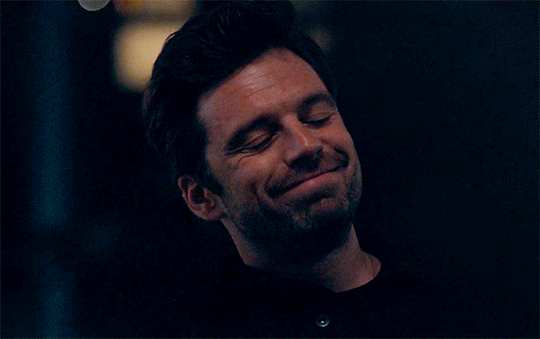
“Explain the killer. What does he do? What motivates him? How would you catch him? A thousand words printed by the next class. Have a good weekend,” your professor, Dr. Barnes, announces with a nod, cueing the shuffling of laptops and bags belonging to FBI trainees eager to get home on a Friday afternoon.
You load up your things, your mind still thinking about the brutal crime scene photos shown on the slides of the lecture today that made your stomach turn over. While you know you have chosen to be at the FBI, you can’t help but wonder sometimes what you are doing there. Your degree in psychology and doctorate in criminology has led you to the FBI Academy, but your mind still swirls when the most horrible acts of violence are placed in front of you. You chalk it up to you retaining your humanity and sanity, so you are not exactly upset over the fact. It just makes your job more difficult.
Dr. Barnes’ class is always the most brutal, but it is by far the most fascinating class you have. It does help that your professor is the most fascinating part, being very good looking and extremely private. He shares very little personal information, telling you only that he used to work homicide at the police department before beginning teaching. You notice that he does not talk to students often, simply giving his lectures, packing up and leaving after the sea of students flood into the hallways.
You are curious about him, about what he is like when he is not lecturing, and figuring that you have little to lose, you decide to come back after your classes to ask for some help.
…
“Dr. Barnes?” you call out as you step into the lecture hall that is still lit, leaving you to believe that someone is there. You take a few more steps and find your professor sitting at his desk, photos piled around, staring intently at the laptop in front of him. He makes no movement to acknowledge you, his focus completely locked onto his work.
You walk all the way up to his desk, repeating his name which does little to deter him. You reach a hand out and give his shoulder a slight squeeze, causing him to jump in his seat and look up at you, eyes wide.
“Sorry, Dr. Barnes. I didn’t mean to scare you.”
At your words, he scans your face, recognition dawning on his features.
“Sorry, I didn’t hear you,” he says quietly, his eyes focusing on the books you are holding in your hands.
“It’s okay, Dr. Barnes,” you assure him.
“Is there something I can do for you?” he trails off a bit at the end of his question, asking for your name in its absence.
You fill in your name and explain, “I just have a question. I’m writing a paper for another class and was hoping that you could give me some insight on the topic. I’m really just looking for another perspective.”
“Of course,” he says as he leans back in his chair. There is not another chair, so you take to sitting on the edge of his desk.
“The paper is about female serial killers, and I was wondering what you think the most common traits and motives are. We have discussed some examples in class, but I wanted to ask what your experience has been.”
He thinks for a moment, taking his glasses off and rubbing his eyes. “They usually work in health care professions. They’ll, um, they will be married or have been married before. They usually kill to improve their situation, so they’ll target people they know, usually men. But not all women,” he stops and looks up at you before continuing to explain a case he had while working homicide where they investigated a series of killings that followed the signs of a male killer but ended up being a woman.
Dr. Barnes runs a hand through his hair when he finishes, leaning back in his chair. You can’t help but notice how good he looks in this position and at this angle. His dark hair tousled and glasses twirling between his thumbs, you think about how it would feel to reach out and feel his hair between your fingers. You school yourself, your face becoming hot at the idea. He is your professor, and you would do well to remember that.
You continue the conversation, asking him questions and prodding for more insight. When you figure you have taken up enough of his time, you bow your head a bit and begin getting up from your place on the desk.
“Thank you for your help, Dr. Barnes. I really appreciate you taking the time.”
He nods in acknowledgment, a small smile adorning his lips which you watch perhaps a little too intently as he says. “It was nothing. I’m glad I could help.”
You begin walking toward the door of the lecture hall but are stopped by your name being called out.
“Would you actually mind taking a look at these pictures? I’d like to know what you see.”
You turn back around. The look on his face is one of curiosity. You wonder why he would want to ask you, and part of you wants to believe that it is because he wants you to stay, but you know better.
“Sure,” you shrug, making your way back to his desk. “I’m not sure I’ll be of much help, though”
“Just take a look. It’s not a test, if that’s what you’re worried about,” your professor says, standing up to hand you the crime scene photos.
They are gruesome, but you don’t know what else you could have expected with Dr. Barnes. You examine them all the while trying to ignore the way he leans over your shoulder as you fail to concentrate. You are so close that if you took a single step back, you would be flush to him.
Pushing those thoughts away, you focus your attention on the photos, flipping through them, noticing the odd blood splatter near the baseboard that doesn’t have a body laying anywhere near it.
“What would make the killer climb on top of the counter to shoot someone, get down, and move the body?” you think out loud as you turn your head to look at Dr. Barnes. You notice how close your faces are and let out a breath at the discovery. “Dominance?” your voice is more shaky than you wanted it to sound.
“I was hoping you could tell me. My guess is they were waiting there, but it still doesn’t make sense,” he says, looking past you and to the picture you are holding. You look back down as well, grateful you did not make eye contact, the idea of the intimacy of it alarming.
“If they were standing on it, that would make sense, but the angle doesn’t really fit. It seems as if they were waiting for them to get home, and they sat, swinging their legs, completely calm and casual about shooting this person,” you pause, mulling over your words before saying, “Maybe they even knew this person. The proximity to the counter could mean that the victim was comfortable enough to approach them, and that the victim was unaware of what was going to happen.”
He hums in agreement in your ear, and a feeling of satisfaction washes over you. Turning back around, you hand the photos to your professor and take a step back.
“I think you may be right,” he says with a nod, a small smile again creeping onto his features. You make eye contact and keep it, somewhat entranced by it.
“I’m glad I was able to help,” you smile. “Thanks again, Dr. Barnes. Have a good night.”
…
You anticipate going back to classes on Monday, knowing that you have to attend Dr. Barnes’ lecture. You don’t know if anything will be different after the night you spent talking to your professor. Part of you knows that nothing should be different. While there are only a few years between you, you are still his student.
But part of you wants things to be different. The entire weekend, you could not get out of your head the image of his face so close to yours or the sight of him as he leaned back in his chair, legs casually falling open.
Dr. Barnes is not in the lecture hall when you arrive for which you are grateful. You settle into your seat and wait for the lecture to begin by fiddling with your laptop. When your professor does come in, you notice that he combed his hair today, letting it fall neatly over his forehead. The plaid shirt he wears still doesn’t match his suit, but you find it charming. He slips his glasses on and begins teaching.
The whole lecture you try valiantly to focus on the subject, but you fail rather miserably, unable to think of anything but how you stood right where he is, your back a foot away from his chest with him humming in your ear. It is going to be a long term if this is how every lecture is going to go.
You are brought back to reality when Dr. Barnes makes eye contact with you. He smiles which you quickly reciprocate, then he turns around, gesturing to the screen before anyone notices.
It is definitely going to be a long semester.
…
Weeks go on with you and Dr. Barnes smiling at each other from afar, both of you knowing that you would be playing with fire if you do anything more than smile. But the longer you go simply smiling, the more you want to do something about it.
And one day, he does something about it. On your way out of the lecture hall, Dr. Barnes stops you, calling out your name. You walk over, anticipation coiling in your stomach.
“I’ve another case I’d like your opinion on. Do you have time tonight to take a look?” he asks you quietly so as to not draw the attention of the students still exiting the room.
“Yes. Here at 7:30?”
He nods, making a flash of eye contact which you return with a smile.
…
You make your way to Dr. Barnes’ lecture hall, your stomach roiling with nerves. You have thought too much about him, fantasized a little often for you to not think about it when you talk to him. The soles of your shoes click on the tile as you walk the hallway. You take a deep breath and open the door.
Dr. Barnes is reclined behind his desk, crime scene photos in his hand as he flips through them intently. At your entrance, his head flicks up to find your figure approaching his desk.
“Hey, thanks for coming,” he says as he stands up.
“Hi, yeah. It’s – yeah it’s no problem, Dr. Barnes,” you manage to get out, tripping over your words more than you would have liked. Another deep breath to collect yourself. “What can I do to help?”
He leans against the front of his desk and reaches behind him to grab the photos he was examining before. You take a few steps closer to grab them from his outstretched hand.
“A recent set of murders. It’s odd to say the least,” he starts, watching you intently as you study the photos.
The scene is horrifying, blood smeared across the walls, not as blood spray or splatter, but in an image. A lamb. Your mind spins as you look through more of the pictures, each of them showing blood splashed on the walls. You wonder what the killer did in order to get that much blood. There is too much for it to have come from just one body.
“How many people were found dead?”
“Only one,” he answers, leaning in to help you find the image of the body heaped over the table. You can’t help but notice everywhere his body touches yours, how his breath flutters against your neck, but you cast those thoughts away to focus on the case at hand.
“There had to have been more. There’s too much blood,” you mumble as you cart through the images again, counting as you go. A beat passes as you take in the scene, contemplating before constructing ideas.
“What do you see?”
“In ancient religious practices, a lamb would be sacrificed and the blood would be sprinkled around seven times. There are seven places where the blood was thrown on the wall,” you pause to show him each one. You glance up at your professor who is looking on intently, urging you to continue. “Then you have the body placed on the table. It could be sacrificial. The lamb was supposed to be perfect. Without blemish. Maybe – maybe the killer saw this person as their perfect – their perfect lamb, as someone who would put them in favor with God. The sacrificial lamb is sacramental. Symbolic. Messianic. It’s an act of repentance. So what was the killer repenting from?”
A hum from Dr. Barnes pulls you out of your reverie and breaks your focus from the crime scene photos. You lean around his form to place the pictures back on his desk, your shoulder brushing against his arm. His eyes follow you before he brings a hand up to rub his eyes, almost like he is physically rubbing away the images.
“Do you think the killer knew the victim?” he asks quietly, bringing his hands down to meet your eyes.
“I think they could be family. Family or close friends. They were their savior,” you answer, matching his tone.
Dr. Barnes nods in agreement and in that moment, you can see that he looks like a man who is carrying the world on his shoulders. He slouches forward slightly, his hair strewn around his ears with bags under his eyes. It takes everything in you to not reach out a hand to touch his cheek, to rub a thumb across his lips as you have in your dreams.
Appalled by your own thoughts, you take a step back to give yourself space to halt that train of thought. The movement makes him stand, subconsciously trying to keep the close proximity between you. You don’t break eye contact, making the moment intimate. Intense.
“This case has been keeping me up at night,” he confesses as he brings a hand to run through his hair with a sigh, breaking eye contact. “I wonder where the other bodies are. I can’t seem to get my mind around it.”
“I’m sure you’ll figure it out,” you say in nearly a whisper. “You’re good at what you do.”
“Thank you for your help. It’s some really great insight you had.”
“It’s no problem, Dr. Barnes.”
“Bucky,” he says quickly, rushing it out like he knows he shouldn’t let it pass his lips.
“Bucky,” you repeat, trying the name out on your tongue.
You then fall into easy conversation, learning more about each other. You discover that Bucky has a PhD in criminology as well, and that he used to be a field agent but decided to leave it to become a teacher at the academy. Part of you wants to ask why, but you figure that it isn’t a conversation he wants to have while still getting to know you. He asks about your life, your family, your education. He is interested in why and how you landed at the academy. You answer him honestly, not inclined to hide away as you normally do when people ask those questions.
Bucky is surprisingly sociable. Based on his reclusiveness when it comes to students, you were not expecting to hold such easy and fun conversation. It makes you want to spend the whole night chatting, joking, exploring. But you know you should not stay.
When the conversation lulls, you glance at your watch and ask, “Is there anything else I can do for you, Bucky? I think I might head home.”
Before you can even register what is happening, he takes a singular step forward and leans in to meet his lips to yours. In shock, you stand limply, not sure how to respond. You can’t deny that you have thought about this moment for weeks, dreaming about it, imagining what it would be like to kiss him. Bucky. But you hadn’t expected it to happen tonight.
And before you have time to respond, he pulls away, opening his eyes to look at you with wide ones of his own.
“I’m sorry, I–”
You don’t acknowledge his apology, instead leaning in to kiss him again, only you are prepared for it this time. He responds immediately as his lips move slowly over yours, testing the waters. Your hands are still by your sides, but his come to settle in your hair and over your arm. His kisses are controlled and soft, not pressing for more than what you are willing to give. A sigh flutters from your nose which ghosts over his cheeks.
Breaking away for a second, you open your eyes and find his already looking at you. The both of you know that you are playing with fire. You are still his student, and he is your professor, but the feeling of his lips on yours overrules any rational thought at the moment.
You give a slight nod and he takes that as a green light to kiss you again. Bucky pulls you closer, and your hands find their way around his torso, snaking up into his hair. It is his turn to sigh at the action which causes satisfaction to roll down your back in waves that has you leaning further into the kiss, opening your mouth ever so slightly. He takes advantage and kisses you deeper. A soft moan escapes you at the feeling, followed by a shaky breath.
He pulls away, a triumphant smile playing at his mouth.
“I’m not sorry,” he whispers.
“Me neither.”
He kisses you once more, chaste and short, but it carries more meaning than any of the other kisses. It tells you that he has thought about this, too. It wasn’t a spur of the moment, impulsive decision. And it tells you that he plans on doing it again.
…
You settle into a routine with Bucky. After class on Fridays, he stops you on your way out and quietly asks you to come back to look over a case or his lectures. You always nod and come back at 7:30.
The unspoken truth of the need for secrecy looms over your blooming relationship, but you are almost spurred on by the illicitness of it all. You haven’t done anything more than kiss. You haven’t even interacted beyond the walls of the lecture hall. You both know that it is safest that way.
The more time you spend together, the more you find yourself falling in love with Bucky. His quirks make you smile. The way he perks up when you walk through the door makes your heart flutter in your chest. You have never felt so valued by anyone before. He trusts your opinions. He respects your honesty. You admire his dedication to what he does. You find his quiet nature calming.
The list of things you love about Bucky keeps you up at night as you replay scenes of kissing at his desk behind your eyes as you fall asleep. Bucky kisses you like you are ice cream on a sunny day, slow and hungry like he savors every second of your mouth on his. He never presses you for more, only going so far as to set you up on his desk, pulling your hips to his, allowing you to wrap your legs around him as you wind your fingers in his hair. He always sighs when you tug at it which gives you the opportunity to kiss at his neck, your chin always getting scratched by his stubble.
You love the routine. However, it makes it hard to concentrate during the lectures since all you can think about when you look at his desk is how good his hands felt on your hips and how his lips were pressed to yours when you were propped up on the wood yourself.
The semester continues on following your routine. If anyone suspects anything, they don’t say. You can’t imagine that someone hasn’t picked up on the soft smiles he sends your direction during lectures, and stragglers leaving class late on Fridays must hear his whispers for you to come back.
Steadily approaching the end of the term, you begin to question how long your routine will continue. You will no longer be Bucky’s student. Could you actually date? Would he want to? Is that what you want?
…
The familiar tug of nerves settles in the pit of your stomach as you walk to class with Bucky — Dr. Barnes if you were still professional, but you figure that his lips have kissed you a few too many times and in a few too many places for you to call him that. It is your last class in his lecture hall, meaning that beyond today, you are free to make a decision as to whether this is serious or not.
In your heart of hearts, you want this to keep going. You love how you feel around Bucky. While you have not said it out loud, you love him. You feel yourself aching to hear him say it, too.
When you arrive in the room, Bucky is already there, nervously flipping through crime scene photos while running his hands through his hair, creating a rather haphazard mess on his head. He looks more anxious than usual, and it takes everything in you to not to stride to his desk and ask him what’s wrong.
Instead, you brush past him, trailing a quick hand over his arm, hoping that it has a calming effect over him. His eyes flash to yours as you cast a look over your shoulder, smiling at him. He sends you a tight lipped smile back as his shoulders shrug down from their place beside his ears.
From your seat, you watch Bucky pace around a bit, obviously concerned about something. You rub your palms over your thighs when you discover them clenched in worry. You wonder if his stress has anything to do with the reason you were nervous coming to class today — the talk you know is coming tonight. You figure it does when his eyes glance over at you every few minutes before beginning the lecture.
You find yourself becoming sentimental about the semester as you look around the room, taking in the feeling for the last time. If you and Bucky do decide to continue your relationship, you can never take one of his classes again. If you don’t continue to see Bucky, you doubt you will want to take one of his classes again. You will miss his funny side comments that come out of left field. You will miss his mismatched suits and disheveled hair.
The sound of Bucky announcing the end of class breaks you out of your thoughts, and the shuffling of backpacks and feet brings you back to reality. A stream of students thank Bucky as they flow out of the classroom for the final time. You stall a minute, waiting for the throng to exit out the doors before approaching your professor.
“Hey, Bucky,” you say quietly, clutching your laptop to your chest.
“Hey.”
You watch him lean against his desk, hands pressed to the edge of the wood.
“How are you doing?” you ask the question that has been waiting to erupt since you entered the lecture hall an hour previous. “You seem nervous.”
A chuckle that comes out more as a sigh escapes him. “Yeah. I’m fine. I, uh, I just didn’t get much sleep last night. How are…how are you?”
“Wistfully contemplating the end of my time in your class,” you reply playfully, hoping that the happy tone will hide the melancholy you really feel about the idea.
This elicits a laugh from Bucky as he looks at you through his lashes — a look that always has your knees threatening to come out from under you. You take steps closer and set your laptop down on his desk, then place your hands on his shoulders, running them down his arms to settle in his hands.
“Do you want to get dinner with me tonight?” you ask, the words barely more than a whisper. You want to catch them in the air, afraid that your proposal to disrupt the routine will be rejected.
But Bucky smiles immediately, thinking for a moment before saying, “Why don’t I cook dinner?”
Your stomach flutters at the thought of watching him in the kitchen. You nod in response.
“7:30?”
“7:30,” you repeat before letting go of his hands to walk out the doors, throwing a smile over your shoulder as you go.
…
The drive to Bucky’s house is quiet but comfortable. About halfway through the trip, your hands link together, resting on your thigh. You talk lazily, asking questions about each others’ days since your morning lecture. There is something so calming about Bucky. You trust him. You love him.
Every once in a while, your eyes flick over to watch him drive, eyes intently focused on the road ahead. He can feel your gaze, so he sends a glance over to you with a soft smile playing on his lips.
“What?” he asks when you don’t shy away from his eyes.
“Nothing, Buck. I just like being with you.”
“I do, too.”
The sweetness of his simple confession does more to your confidence than you ever thought possible. You feel comfortable around Bucky. You need only be yourself when you are with him, and hearing that same sentiment from him gives you hope that he wants this to continue just as much as you do.
You squeeze his hand, at which he laughs softly, squeezing yours back, brushing his thumb over the knuckles on the back of your hand.
Gravel crunching under tires and the faint sound of dogs barking indicates that you have arrived at your destination. You open the car door and follow Bucky to the front steps of a small house on the edge of town. A large open field is situated behind his house, neighbors nonexistent. Given Bucky’s personality, you are not surprised to discover that he lives alone, away from people, away from the city.
A flash of nervousness pricks at your mind, as no one would be around if Bucky shows you that isn’t the guy you think he is. But you trust him, and you trust him enough to accept your fate if it does prove to be your downfall.
The door creaks open, and Bucky flicks on the light. Two big dogs come bounding to greet you both, circling his feet until he crouches down to give them the attention they are begging for. To see Bucky with his dogs makes your mind go fuzzy and warm, the tenderness of the scene eradicating your doubts from before.
“Charlie and Duke,” Bucky says, showing you which dog belongs to which name, rubbing each of them affectionately before standing and grabbing your hand.
“They’re adorable.”
“They’re good dogs.”
He leans in for a quick kiss, the domesticity of it causing your breath to catch in your throat. He pulls away smiling, then tugs you into the kitchen where he drags a chair out from the table for you to sit on.
“Sit,” Bucky says with mirth in his voice.
You laugh but do as you are told.
“I was thinking of making steaks. Is that okay with you?”
“Sounds great.”
You watch Bucky make his way around the kitchen, obviously having done this a lot. He looks comfortable. He catches you staring, meeting your gaze head on, an easy smile adorning his mouth before asking, “What are you smiling at?”
“You. I like seeing you here,” you say quietly.
“Not as much as I like seeing you sit at my table. I’ve thought about this a lot,” he admits with his back to you as he throws the steaks in the pan. “I like being around you. I’m more comfortable with you than anyone else. You make me feel — you make me feel normal. Most people don’t do that. They don’t — they don’t want to understand me. My old friends can only think about who I was before I quit the force. They don’t — they don’t want to like who I am now.”
The words spill out of Bucky before he can stop them, opening up to you in a way that he has not before. He has let you in here and there over the months you have been spending together in the lecture hall, but he has stayed rather private even then. Not sure what to say in response, you simply move from your place at the table to stand behind him, wrapping your arms around his torso, resting your cheek on his back. You can feel him relax into your touch, and it is a comfort to you both.
“Bucky, I think I am in love with you,” you whisper into his shirt. His body tenses, the sizzling of the meat in the pan filling the silence. Your heart pounds in your chest as you wait for him to say something. Burying your face further into him, disappointment and embarrassment creeping in your stomach, settling heavily when he doesn’t say anything. When a minute that feels like an eternity passes in silence, you mutter a quiet, “I’m sorry.”
You let go of Bucky and take a step back. He quickly takes the pan off the heat and whips around to face you, pulling you back to him, whispering your name.
“I love you,” the words are sure and confident coming from his lips. “I know I do.”
He looks at you intently, not shying away from your eyes before leaning in and kissing you softly. You get lost in his kisses, the pounding of your heart racing at a steady quick beat. Bucky backs you into the counter where he cages you with his hands as you weave one of your hands into his hair, the other running up his spine.
“Stay the night,” he mumbles between kisses.
You pull away and nod, meeting his eyes again, kissing him once without breaking the contact.
…
Settling on his couch after laughing yourselves silly over the dinner table, Bucky is close behind you with bowls of ice cream in hand. He hands you a spoon before sitting down right beside you, pulling your legs to stretch over his lap. He runs a hand absentmindedly over your shins as the two of you eat your ice cream.
“Why did you come talk to me that night?,” he asks between spoonfuls. “You didn’t really need my help. You knew everything I was telling you.”
You smile like a child caught with their hand in the cookie jar. “I did need your help,” you assert before admitting, “but I also just wanted an excuse to talk to you.”
The sound of his laugh makes your heart flutter the same way it does when he looks up at you from behind his desk.
“Hey, not all my professors are attractive recluses who deserve a starring role in my nightly fantasies.”
“Oh, so you fantasize about me,” he presses, the smirk on his face unlike any expression you have ever seen on him. He looks smug, proud, teasing. It makes heat flash to your core.
You hum but it comes out more as a squeak, your focus turning intently on the ice cream melting in your bowl.
“Do you want to know what I’ve fantasized about you?” Bucky asks lowly, grabbing the bowl from your hands, causing your eyes to lift to his. You watch him set it on the floor. Your heart begins pounding again as he moves to climb over you, settling between your open legs.
“What have you fantasized about, Bucky?” you ask quietly, voice shaky.
You take a breath when he leans in, capturing your lips in a soft kiss. You open your mouth to deepen it, and he takes advantage, his tongue pressing to your upper lip. The feeling has your hips rolling and sighs falling from your throat.
He pulls away to murmur into your neck, “Every time I would sit on my couch, I thought about laying you down and kissing you until you can’t remember your own name.”
Your eyes are screwed shut as you tug at his hair, his words forming pools of heat between your hips where his own apply pressure. Your words fail you, only a whimper escaping you. His lips move along your neck, working their way back to your mouth, giving due attention to the places on the way that have you squirming beneath him. You hands tug at his shirt to slip your fingers beneath the fabric, skimming up his back, scratching lightly.
His kisses become feverish at the feeling of your nails down his back. One hand hooks your knee to pull your form even closer to his, hips slipping into place. You can feel yourself becoming wetter by the second, the slow circling of his hips against yours creating friction that has you moaning.
In one swift motion, his hands are gliding up your sides, taking your shirt with you. You lean up to help him before settling back down against the pillows. He sits on his heels to take his own shirt off which allows you to see him in the faint light casted by the lamp in the corner.
You notice a shining scar that extends from one hip to the other below his navel. Fingertips reach out to touch it, barely making contact before his own hand stills your movements.
“Is this why you quit the force?” you ask barely above a whisper.
He only nods, his feelings of vulnerability silencing him. You aren’t disgusted by it. It doesn’t change how you see him. You don’t pity him. You are simply curious. And amazed at his strength. He survived whatever left him this scar.
“Can I see it?”
Bucky takes a fluttering breath through his nose then nods again. You climb to the floor, resting on your knees between his legs. You glance up at him and see his head lolling to the side as he looks down at you, eyes hazy and soft. His eyebrows are scrunched, letting you know that he is concentrated, but the dam of secrecy surrounding Bucky is breaking with every passing second.
Tentatively, you stretch a hand forward, your fingertips grazing the scar. His stomach flexes beneath your touch.
No one has seen his scar since the doctor sewed him back up. He has a fear of pity. He knows that people won’t see him the same when they see the effects of what happened to him — of what was done to him. But he doesn’t see pity in your eyes. He sees awe and amazement.
Without warning, you press your lips to his stomach, the intimacy of it rendering his mind blank. You hear him swear quietly which urges you to keep going. You kiss all along the scar, his hips, then upwards before you climb into his lap. You find his lips again and kiss slowly, surely, passionately.
“I love you, Bucky.”
“I love you, too.”
You share a few more kisses before he stands up, pulling you with him to his room. He fumbles through his dressers to find a shirt and pair of shorts for you to wear. He hands them to you, then rummages through the bathroom cabinets to find a new toothbrush for you to use.
You thank him after he says that he will meet you back at the bed. The calm and comfort of being with Bucky is undeniable. The domesticity of the night has your heart skipping beats. You quickly change and brush your teeth before making your way to his bed. Noticing books stacked on the nightstand on one side, you slip under the covers of the other, sighing contently when you settle in.
Bucky comes in a moment later with only sweatpants hanging low on his hips. He decided to not put a shirt back on, relishing in the freedom that being with you gives him. He doesn’t climb into bed immediately, but rather stands and looks at you for a moment, curled up in his sheets.
“What have you fantasized about here?” you ask teasingly, but your voice comes out thinner than you had intended.
At your words, his tongue darts out to lick his lips. He approaches the bed slowly, kneeling down beside you.
“I want to know yours,” he says, his voice husky and low. You bite your lip, your eyes widening. A shaky inhale.
Soft kisses line the inside of your knee, trailing a path up your thighs. You let out a hitched moan when he places a kiss to your clothed core, your hands winding themselves in his hair. You tug slightly, inviting him to come up to the bed with you.
When he climbs up, you lean back, your shirt riding up over your stomach. Wordlessly, you pull his hands to your body, his calloused palms caressing the exposed skin. He runs his thumbs under your breasts, causing you to arch into his touch. Bucky can’t believe that you respond to him so keenly. He barely touches you and you are curving beneath him, aching for more.
His lips find your neck, behind your ear, sucking gently. Your hands pull his hips to yours, rocking steadily into him. You suck in a breath, gathering the courage to grab one of his hands to lead it to where you want to feel him the most.
Bucky follows your lead without resistance, kissing you softly in an expression of consent. He helps you pull your shorts off, then presses two fingers to the wet patch on your panties. The pressure has your hips jutting into his touch, overwhelmed by the sensation when his fingers push the fabric to the side.
Your hips move in circles with his movements, his lips kissing you through it all. Moans slip and tumble from your mouth, leaving you hiccupping in pleasure. The cords in your stomach begin snapping when he speeds up his ministrations, your body contracting through your release.
“You did so good, sweetheart,” he whispers to you as he helps you come down from your high.
Your eyes are crimped shut, but after a moment’s respite and a few encouraging kisses from Bucky, you come back to yourself. You open your eyes to find him watching you intently. You smile lazily then breathe, “Your turn.”
a/n: yayayay !! thanks for reading this !! let me know if you want to be on my taglist :):) and here is my masterlist if you want to check out my other work ! and check out MY SLEEPOVER going on right now !!
#bucky barnes x reader#bucky barnes#james buchanan barnes#bucky barnes imagine#marvel#mcu#marvel imagine#james buchanan barnes x reader#mcu imagine#marvel fanfiction#bucky barnes fanfiction#bucky x reader#bucky barnes x reader smut#bucky barnes x you#smut
461 notes
·
View notes
Text
If life is an experiment, your Uranus is your laboratory.
Uranus in the First House: Your Body
You will likely go through various rebrandings in your life. From nerd to glam. From emo to CEO. It will take you a while to discover what you want your physical vessel to look like.
Uranus in the Second House: Your Wallet
You will likely go back and forth between having an excess of money and having none at all. It will take you a while to figure out the right ingredients for financial stability.
Uranus in the Third House: Your Words
You will likely go through various makeovers in how you speak. From punk to poet. From high street to high-end. It will take you a while to discover how to communicate your true self.
Uranus in the Fourth House: Your Home
You will likely experience an unstable home life. That could mean moving around a lot, or your family changing frequently (e.g., through marriage). It will take you a while to find home as it should be.
Uranus in the Fifth House: Your Joy
You will likely have changing hobbies and interests as you grow. Even to the point of being ashamed of what you previously liked (e.g., a band, a celebrity). It will take you a while to discover what your soul enjoys.
Uranus in the Sixth House: Your Lifestyle
You will likely have drastic changes in routines that relate to your identity. From vegan to carnivore. From fitness buff to couch potato. It will take you a while to realize how you want to experience life.
Uranus in the Seventh House: Your Relationships
Your taste in connections (romantic and more) will likely keep evolving. From light to burdened. From friendly to brooding. It will take you a while to realize what you want and need your people to be like.
Uranus in the Eighth House: Your Morals
You will likely have changing definitions of what is wrong. From seeing things like Satanism and death penalty as evil, to thinking they are good, for example. It will take you a while to define your principles.
Uranus in the Ninth House: Your Faith
You will likely have different beliefs throughout your life. You might keep switching from one religion to another and to none at all. It will take you a while to form a true connection with a higher power.
Uranus in the Tenth House: Your Reputation
You will likely have different ranks in society throughout your life. From pleb to socialite. From royalty to nobody. It will take you a while to decide how you want the world to see you in this lifetime.
Uranus in the Eleventh House: Your Community
You will likely be a part of vastly different groups throughout your life. From religious fanatics to agnostic intellectuals. From celebrities to nuns. It will take you a while to discover where you belong in life.
Uranus in the Twelfth House: Your Pain
You will likely have different ideas of what hurts. You could go from crying at the sight of war-torn countries to shrugging about their plight. It will take you a while to decide on what is fair and unfair in this life.
In Whole Sign Houses, my Uranus is in the Ninth. I was raised Catholic. But in truth, I was mostly agnostic. At a fairly young age, I discovered Greco-Roman paganism from my elders who practice it in semi-combination with Christianity. Then in college, I had to pretend to be an atheist around judgmental religious fanatics who hated witchcraft. Now I am a practicing pagan who follows my ancestors' writings over my living elders' teachings. Can you also feel your Uranus manifesting?
Related: If life is a battlefield, your Mars is your weapon.
355 notes
·
View notes
Note
hi! back with (yet another) word nerdy question. (I’ve brought cookies this time!) in the 1941 episodes, Crowley refers to the church as “consecrated ground” but furfur calls it “hallowed ground”, i was wondering what your thoughts on that were? always love reading your metas!
Hi there, @the-ineffable-parker 💕 Thank you muchly & what a very fun topic! Alright, throw on some Hozier 😂 so we can talk about what the story's ongoing discussion about how the show's discussion of what constitutes consecrated ground, including this consecrated vs. hallowed contrast, might have to say about themes around autonomy and authority.
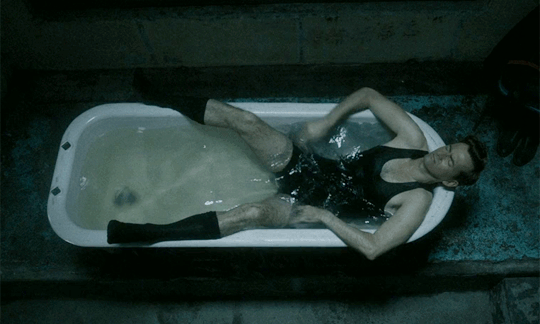
I have also had more than one anon send me a request for stuff on consecrated ground so *radio voice* this one also goes out to all you lovelies who were not only nice enough to ask but who gave me an excuse to look at Aziraphale-as-Crowley in the bathtub during an otherwise kind of irritating week. 😂
TW: Mentions of Heaven & Hell violating bodily autonomy.
Consecrated vs. hallowed is an example of offering the audience a pair of near-synonyms for the purpose of having a conversation about the themes that come up when looking at the differences between these words. There are others like this in Good Omens, too:
Welfare vs. quality of life. Magician vs. conjurer. Job vs. profession. Seller vs. purveyor. Father vs. dad. Master vs. boss. The historical mister vs. doctor debate. Lift vs. elevator, etc..
So, what of consecrated vs. hallowed?
Technically, both of these words mean that which is considered to have been made holy through some sort of rite or ceremony. You wouldn't use them interchangeably, though, because one of the words-- hallowed-- has evolved to also have a secular meaning, whereas consecrated has remained a word that-- unless you're writing something blasphemously sexy 😉-- would still just be used exclusively to describe something faith-based.
Hallowed ground can be theatres and libraries and historic buildings and the like but, when we're talking about physical locations, consecrated ground is still considered just places of worship and burial sites and other religious places.
Hallowed is an example of a secular evolution of a word in a direction away from its original, religious meaning. There are many that have gone that route and also many that have been stolen by religious groups. Good Omens focuses attention on quite a few words in these crosshairs, like passion, profession, joy, and halo. Contrasting hallowed with consecrated allows the story to have a discussion about how linguistic evolution away from religion reflects many, if not all, humans also evolving away from it.
The word hallow is a pretty-much-obsolete-unless-you're-writing-a-press-release-for-The-Vatican word for a saint, which is how it came to mean that which is holy. This is also the etymology of why we call the holiday at the end of October 'Halloween', from its earlier name of All Saints' Eve.
Halloween is pretty much the most perfect evolution away from anything once at least somewhat related to Christianity that has ever existed 😂 and the evolution of hallowed is much the same so it doesn't surprise me that a demon like Furfur would prefer to use the word hallowed over the word consecrated. The demons were all ex-communicated from Heaven so they're all for humans blasphemously evolving religious words away from those types of meaning.
This is where we have to get into the big question that bringing up these words in the first place asks of the audience, though, which is:
Who gets to say what is holy?
Good Omens' theme of autonomy is freedom is, unsurprisingly, interwoven with its theme of recognizing your own authority to author your own life.
We sometimes might think that there is a higher authority who can answer things for us-- someone more powerful than ourselves. We might be prone to thinking that fallible human beings who are seen by some as holy should be granted authority by us when it comes to influencing our thoughts and actions. In thinking this, we're selling ourselves short and allowing others control over us. It impacts our ability to self-determine and impedes our freedom and our health. The effects of this are so dangerous that it puts our lives at risk.
There are people, often some men, who will say that there is a God who has granted them the power to speak for them. That their word is God and that if you aren't following their word, you aren't following the word of God, and that means you are evil. You are a demon. You are a heretic. You are anathema. You are a sinner and will be forever damned. And they will use this power they claim comes from God to maintain their own power and while controlling and abusing others.
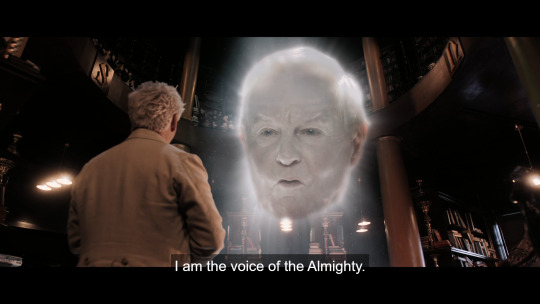
They will try to poison your mind with self-loathing and try to convince you to harm yourself by repressing yourself and denying your own needs. They will try to tell you what to consume with the body that is, at once, both supposed to be seen as a celestial temple but also repugnant and unholy with impure needs for which you should repent. They will, if you let them, cause you to starve yourself in every possible way there is to do so.
They will try to tell you that you're sinful if you desire or love another consenting adult of whom they don't approve. They will try to tell you what to wear, what to eat, how to behave, to most exemplify what they consider to be pure, and not accept that you might think differently. They see your body as belonging to them and do not recognize your autonomy.
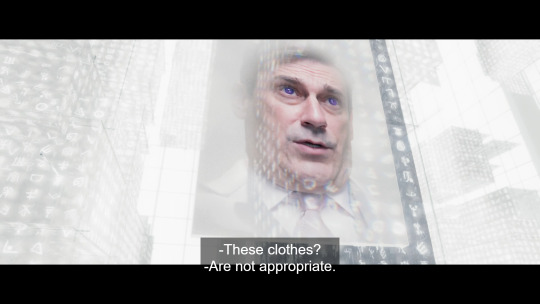
These are just people. They have no authority that you don't give them. They do not care about you-- they want to own you. They will harm you to maintain their own power. You do not need to listen to them. You are the judge of you. Autonomy is freedom and freedom cannot be had by listening to people who try to do you harm. You are the higher authority you're looking for.
The question of who gets to decide what is holy? is, really, also the question of why should anyone recognize as a holy authority anyone who does not respect the sanctity of a person's right to autonomy?
If you notice, Furfur isn't really shocked that Crowley was able to get into a church and remain unharmed. He isn't all omg how did he not go up in flames upon crossing the threshold?! He's just surprised that Crowley elected to go into a church at all, since the whole thing about all the original demons is that they were all thrown out of Heaven. This goes along with other scenes about consecrated ground that we've seen in both seasons.
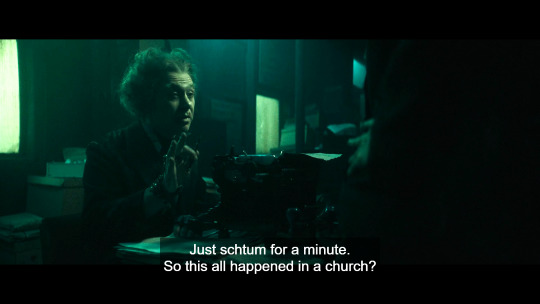
It seems that the insides of churches are considered the domain of Heaven by the demons, who, as the metaphorically dead, prefer to haunt their territory of churchyards. This would make sense since we've already seen many other scenes showing demons walking across what would be considered consecrated ground without issue, like Crowley, Hastur, & Ligur in the churchyard in 1.01, and Beez in the Edinburgh graveyard in 2.06.

This is where we can also see that there's a question of whether or not there's even such thing as consecrated ground in the 'will burn a demon' sense in Good Omens.
If four demons have been seen walking around churchyards and if Crowley has been drinking Chateauneuf-du-Pape from vineyards in Avignon-- the former site of the papacy where every square inch of it was long ago consecrated by the Catholic Church-- then it's pretty clear that human beings, at least, do not have any authority to consecrate in the religious sense any bit of land or water or the like.
That would go along with the themes we're discussing here, as it effectively says that there is no human being on Earth with any divine power beyond the fact that every human being is a divine star child because being human itself is what is supernatural. The Earth itself is all consecrated ground and should be treated as such but, say, parish priests blessing water and land and all that is not really doing anything.
This would mean that all genuine holy water in the series-- like the stuff that killed Ligur-- would need to be made from or blessed by a literal angel. The "holy water" in the church in 1941 was just water, which is what Crowley was joking about, but he'd later apparently felt that he found some actual holy water in some church by 1967 that he had been planning to rob. Considering that Aziraphale knew about it, it's likely that Aziraphale was even the one who had blessed the water in that church.
This is even if holy water blessed by literal angels in Good Omens is real and, yeah, I say that even after Ligur, because you could argue that it's possible that Ligur believed it was real and that's really how he died. In a story where Crowley willed himself alive through the M25 fire and with the whole make it happen, make it real theme... I'm still not really convinced that holy water and hellfire are things unless you actually believe that they are. They well might be but I think that it's at least a bit open to interpretation.
Additionally, you'd think that the most consecrated place anywhere for a demon ever would be Heaven, right? That they should never be able to step foot back in there ever again, if any of this consecration stuff is real? Except, we've seen that's not the case...
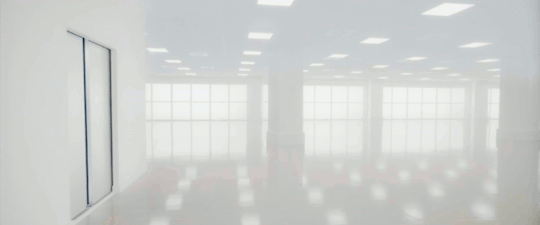
Yes, you could argue that maybe Heaven and Hell did some magical exception thing to trade Michael down and Eric up in the holy water/hellfire part of S1 but Crowley strolling into Heaven in S2 would seem to negate that idea. It's more that angels can get into Hell and demons into Heaven but they mostly usually just don't because those places are considered enemy territory by one another, even if it's all the same terrifying office building.
Crowley explaining angels as bees to Muriel also showed that he already thought it was more a matter of blending in than getting into Heaven. And what did he do when he followed Muriel to their office?

That silly little hop dance, poking fun at the idea of consecrated ground, as he undoubtedly also was thinking about the church in 1941. Heaven, ugh, it's like being on a beach in bare feet! Let's hop to it, Inspector Constable, and get outta here... 😂 As we saw, he was fine to walk in Heaven, which makes it then pretty unlikely that he wasn't also fine to walk in a human church in 1941.
People are going to burn me at the stake for this lol but... I've always thought that things like this make it more than likely that Crowley was just joking about his feet burning when he entered the church in 1941. *ducks* Let's put it this way-- it's interpretable...
So, regardless of whether or not Crowley's feet were actually burning in the church in 1941, he's being flippant about consecrated ground and, as you asked, why might he use that word in this scene, when Furfur used hallowed and Crowley, honestly, probably often would, too, in other scenarios?

Because physical places, as we've mentioned above, are not the only things that people might consider holy.
Crowley has a very understandable distaste for how Heaven-- and Earthly churches like it-- say you are supposed to starve yourself of consumption and pleasure and keep "pure" the celestial temple of your body. Not only are these ideas just very unhealthy, Crowley is not about to let Heaven's ideas of bodily sanctity be his own when Heaven does not acknowledge and respect anyone's bodily autonomy, including his own.
Heaven abused him. They took his memories, burned him, gave him an unwanted snake side to his corporation. They called him evil and kicked him out and, as he put it when projecting his fall all over those poor goats in the Job minisode, had "given him up to be destroyed," which is a word that was once also used to refer to rape. He's talking about how Heaven declared him a demon, ex-communicated him, and said that, in their view, he and his celestial temple belonged to his rapist for eternity.
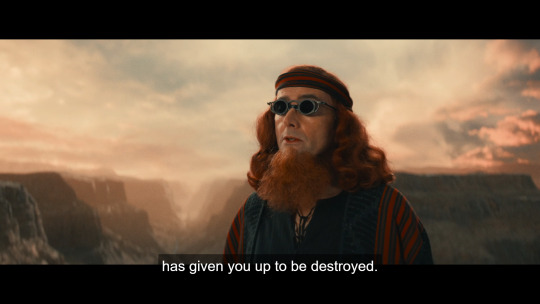
Crowley has religious trauma still as much as the next demon, sure, but, after all he's seen and that has happened to him, he is, ya know, going to generally be a hard pass on buying into Heaven's opinion on what healthy and holy is.
As it is, everything Crowley and Aziraphale believe are truly sanctified are all things with which The Metatron would disagree anyway.

So, in 1941, Crowley is walking into a Christian church, fully aware that he is literally the epitome of everything that church would say is a sin-- a queer, gender-everything, heathen of a demon. Just as Satan and The Metatron forbid relationships like Crowley and Aziraphale's, so did-- and still do-- many human churches like this one... and there was Crowley dryly aware that he was getting to the Nazi-laden church on time to roll up the aisle like he was soon to be Aziraphale's wife.
Whatever a wife is, as Jim so aptly questioned in S2, since that word has a long, patriarchal history implying an obedience that does not reinforce ideas of women being autonomous beings. This church Crowley's entered in 1941 would say that a wife should be subservient to her husband and that would be what would make her holy. Crowley and Aziraphale and their partnership of equals couldn't be any further from any of that.
Within the church, marriage is a sacrament, which is a type of consecration. It's the church sanctifying an union between people. It's an example of an exercise of authority that is supported by getting people to buy into the idea of their church being the only, true authority.
A marriage not sanctified by the church is, in the church's eyes, not a marriage. They define sin and a love that is seen as a sin can never be holy, in their view. This only matters if you recognize the church's authority.
Just as Heaven and Hell don't recognize Crowley and Aziraphale's love as holy, neither did this church. Neither did the country they were in, either, as it was 1941. Forget about it being illegal to marry Aziraphale at that time, it was still illegal in England just to be queer then, as it also was pretty much everywhere else.
Crowley entered the church knowing that the entire known universe at that time would never recognize his right to marry Aziraphale because it didn't even recognize their right to be themselves, live their own lives, claim their bodies as their own and make their own decisions about them. All of that was-- and still is-- pretty ironic to Crowley because there are things that he considers holy and his and Aziraphale's love is at the top of that list.
As Crowley entered the church, he was more than aware of how matrimonial all of this was. He was going up the aisle to Aziraphale at the altar in a place that preached that everything about them and their love was a sin. Regardless of whether or not you believe his feet were truly burning, Crowley was making fun of the idea that many people believe places like this church are the epitome of holy when, really, what is truly holy is much of what they call sinful.

He was being every snarky, traumatized queer whom the universe had dragged back to mass for a funeral or whatever, bitchily joking to his partner about how it was amazing that they didn't spontaneously combust upon crossing the threshold, evil, sinful heretics that they are. 😂 Argh, angel, I can't believe you're making me go to *church* to rescue you... oh, the consecrated ground-- how it burns my evil toes!
He knew he could get away with being thoroughly obnoxious about it because Aziraphale doesn't really disagree with him about any of this. Crowley's lover got humor. She's the giggle at a funeral. Crowley compares the non-existent physical pain to "like being on a beach in bare feet" and we've seen that he and Aziraphale use the sea to refer to sex so it's saying that this is all just the worst, having to romance Aziraphale by going into a church, but he's naturally there anyway because of course he is. 💘
Walking on a beach in bare feet is also basically the same thing, from a physics standpoint, as firewalking, which people have done as a religious rite/test of faith for ages. People of these faiths believe that being able to walk across hot stones and the like shows that one is holy because it must take divinity to do so. It doesn't. It's science.
It's literally just that the act of continued walking is what keeps your feet from being scalded. Your body is cooler than the stones and, since you're walking quickly over them, no part of your foot ever touches the hot stone long enough to absorb enough of the heat to burn the way that they would if you were to stand still over them. See above link, if interested, for how that connects to the theme of "walking the Earth"-- "professional cobbler"; "Demon's Guide to Angelic Beings Who Walk the Earth", etc..
There is something very dry about Crowley essentially riffing on things like consecrated ground burning demons and humans thinking firewalking sanctifies them because Crowley is literally a scientist who essentially was ex-communicated for suggesting that maybe there's more going on with the universe than it being there for people to be all "wow, God is amazing!" over.
On this theme, as we see Crowley's autonomy violated by Satan in 1.01, "Bohemian Rhapsody" is practically narrating it and Crowley grabbing the wheel to avoid the truck with🎵 Galileo, Galileo, Galileo, Galileo🎵 blaring through the speakers was connecting Crowley to another polymath who suffered a similar fate.
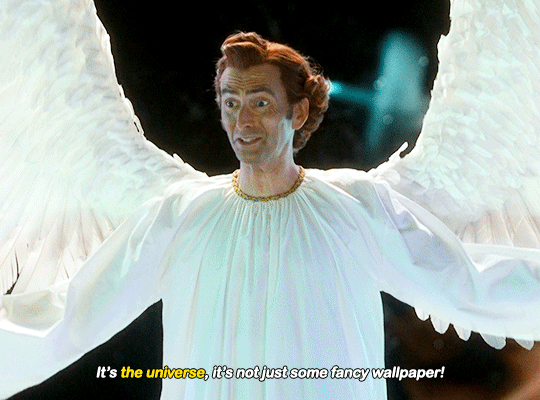
In the church in 1941, Crowley is on consecrated ground to him-- but not because he's in a church. Because he's there for Aziraphale, to whom he's utterly devoted, and their relationship is sanctified to Crowley. Their love is holy to them. Crowley keeps his little dance going mostly for the whole scene and you can see Aziraphale look at Crowley and smile at his shenanigans in the bit below.
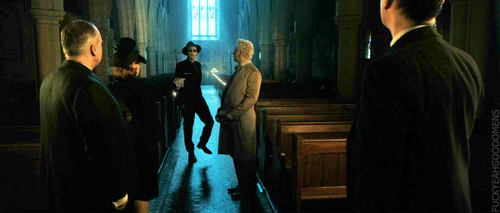
Joking about consecrated ground and Crowley's humor about it in 1941 is also what I think might be behind Aziraphale initially keeping Crowley's feet out of the holy water during the body swap.
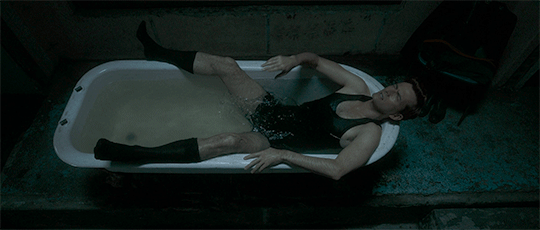
As we saw with Aziraphale's delight over telling Crowley about asking for the rubber duck, he was saying and doing a bunch of things he thought would not only help him to pass as Crowley but which would amuse Crowley when he told him later on. Being able to tell him that he was sure to keep his feet out of the holy water as much as possible would be something that Aziraphale knew was likely to earn him a laugh.
So, Furfur helps to illustrate that the demons are allowed in hallowed places like churches because places of worship truly are, technically, open to anyone there in peace. There are just plenty of people for whom the doors to the church are supposedly open but the hatred there is enough to make them feel less than welcome.
Furfur suspected that Crowley was up to something treasonous when he heard Crowley was in a church with someone because it made more sense to him for Crowley to be there with an angel committing treason than it would be for a demon to want to go to church.
While Crowley, on the other hand, called a church consecrated ground to use the purely holy connotation of the word to make fun of people who felt they could define holiness while not respecting bodily autonomy and personhood, including failing to recognize as sanctified love like that of him and Aziraphale.
In truth, what Crowley and Aziraphale are when they are together is also really the word that Furfur used-- they're hallowed. From the root kailo, meaning: whole, uninjured, and of good omen.
#good omens#ineffable husbands#aziraphale#crowley#aziracrow#good omens meta#ineffable husbands speak#furfur good omens
39 notes
·
View notes
Text
Did Christianity Steal From Paganism? Yes... No... It's Complicated. Part 2: Vikings
Tis the season so I figured I'd talk about the topic that's been the subject of debate for a long time, most recently with the 2024 Olympics. I will be discussing the visual aspect of these religions, not the theological aspects.
Short answer: Yes
Long answer: No
Let's get into it: The Viking era is from 800-1050 AD and can be divided into seven parts based off the style of visual art that was popular. The first style is called the Oseberg style (775-800 AD) and would be the basis of all the Viking styles of art after it. It was made of three forms that were derived from Pagan pre-Viking art: ribbon animals, gripping beasts, and ambiguous forms. You can see it on the bow of the ship below; the ship dates to the 9th century and was found in a burial mound in Tønsberg, Norway. Remember these forms because they're going to be important later.
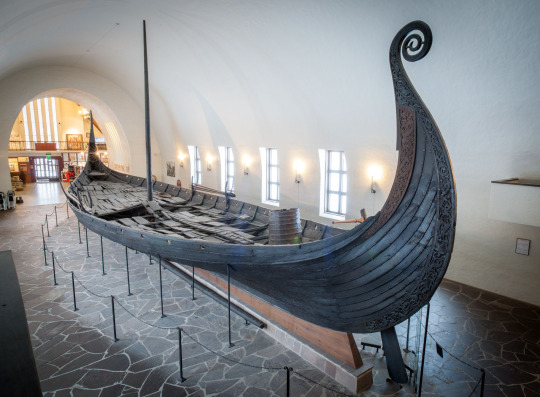
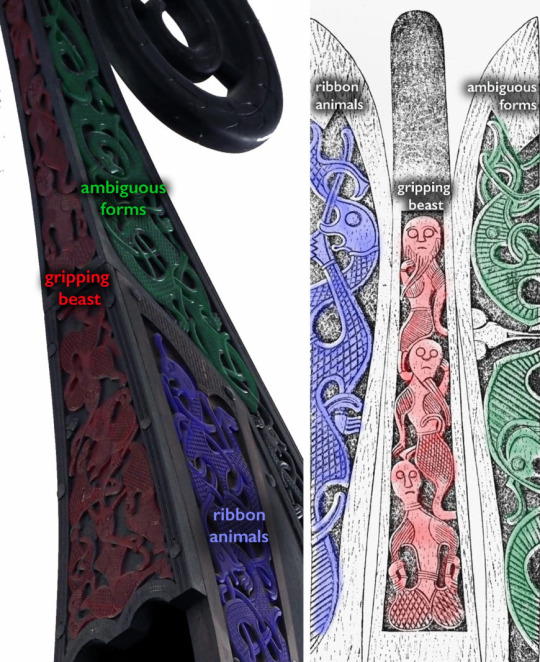
The Vikings started coming into contact with Christian Anglo Saxon (modern day English) missionaries in the 700-800s, but they had little effect. The missionaries were well received by the kings but when their Pagan chieftains threatened to rescind their support, the missionaries were sent away. Another example of that is in 878 AD, the Christian king of the Anglo Saxons, Alfred the Great of Wessex, and the Pagan king of the Vikings, Guthrum the Old, were at war. King Alfred ended up winning and as part of the peace treaty, Guthrum had to get baptized into Christianity. He did so but maintained his Pagan worship and did not implement Christianity.
Besides the kings, common people had also started to slowly assimilate to Christianity. Christians had a rule that they couldn't trade with Pagans so Pagan Vikings began primsigning. Primsigning is an old Norse word meaning "to make the sign of the cross," the way to show you followed Christian beliefs before converting all the way through baptism. Even though they weren't being baptized and were still practicing Paganism, primsigning was enough for Christians to feel comfortable trading with them and brought the Vikings more into the world of Christianity.
An interesting example of this is in Kopparsvik, Sweden, where a large number of Viking individuals were buried in a prone position from 900-1050 AD. This is completely different from traditional Pagan Viking burials: there were no grave goods, no animal sacrifices, no mighty ships. Typically, a prone position is a sign of showing humility towards God and all the figures had notches carved into their teeth (below). Historians theorize that they used the notches to secretly signal to Christian merchants that they were also Christian to get discounts while not being alienated from their Pagan communities.
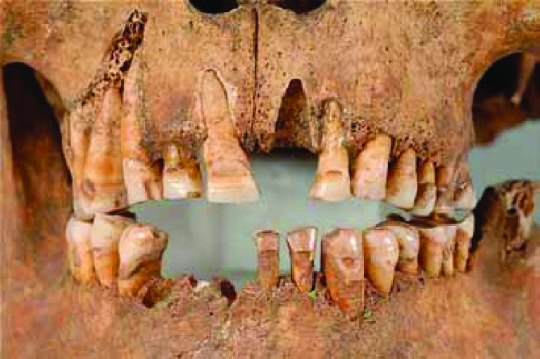

The coin below is from ~921 AD. It's a Viking coin from York, England and wonderfully shows the mixing of Pagan and Christian iconography. Coins like this typically had the name of the Viking king engraved on them but this one has "St. Peter." However, it also depicts the hammer of Thor on both the head (left) and reverse (right). It really demonstrates the visual mixing of religions.
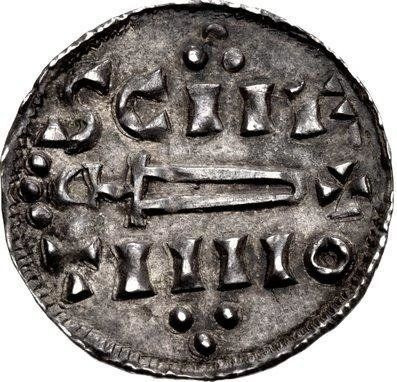
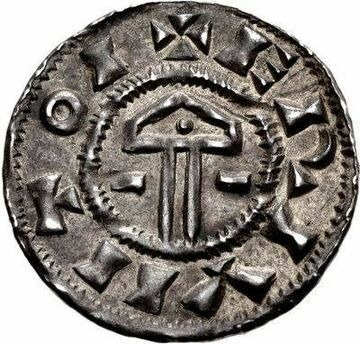
Sometime between 940-1000 AD, the cross below was made. It was found in St Andrew's Church, Andreas, Isle of Man (between England and Ireland), and is another great example of the combination of Pagan and Christian art. On one side (left) it depicts Odin with one of his ravens fighting the wolf Fenrir at Ragnarök. The other side (right) depicts Christ triumphing over Satan. Both of these are stories of good vs evil and depict a god triumphing at the end of days. It would have drawn attention to the theological similarities between Christianity and Norse Paganism, making it easier for people to conflate the differing theologies.
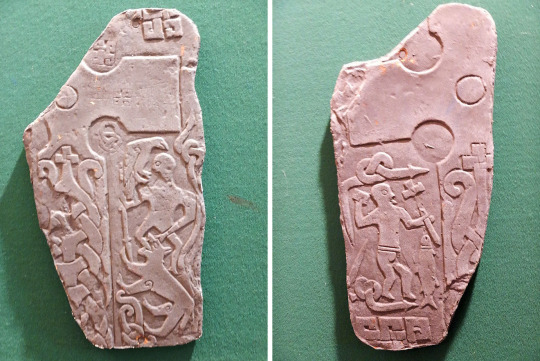
Remember the Oseberg style from before? We're going to revisit it. By the 900s, Viking art was being done in the Mamman style; the ribbon animals and gripping beasts had combined into an icon called the Great Beast. The Great Beast was a symbol of power and strength, frequently put on longships and other Pagan items. In 986 AD, Viking King Bluetooth, a recent convert to Christianity, had the jelling stone below erected in honor of his deceased parents. On one side, he included a Great Beast; this was to show the strength and nobility of his parents and the nation they ruled. On the other side, he put an image of Christ Triumphant. This makes sense for a cenotaph as the promise of a resurrection is a comfort in the face of death. But the combination of a Pagan symbol of strength and an image of Christ is very interesting; it's doing more than pointing out the similarities between the two religions, it's uniting both Pagan and Christian subjects under his rule and proudly displaying the two different sources of the Viking's strength.
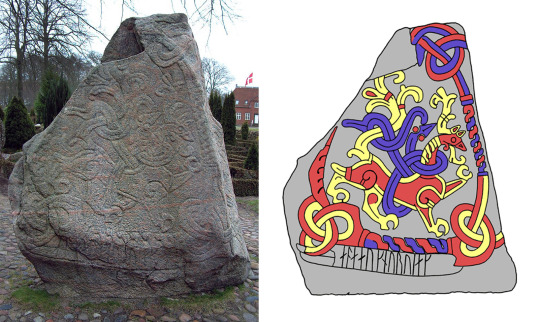
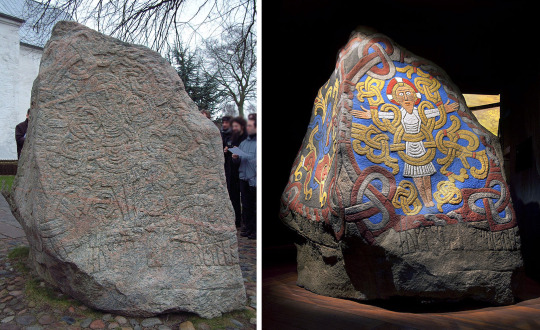
I can't end this without also talking about architecture. The last Viking art style is called the Urnes style and it's primarily because of the church below. It was built in 1132 AD in Urnes, Norway and is a stave church, meaning the whole thing was built without any nails!! The entire thing is self-supporting wood made using the post and lintel system. It's a Chrisitan church but has Pagan iconography on the sides: the last version of the Great Beast (right) and Pagan runes. It's fascinating how a Christian place of worship is decorated and protected by Pagan icons, once again showing the combination of visual cultures and methods of thought.
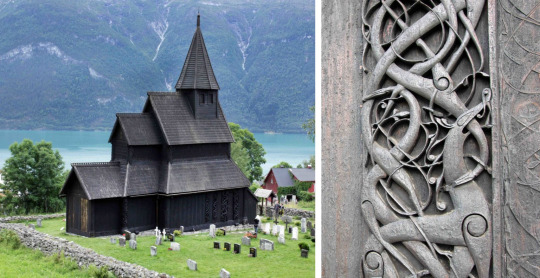
So, the answer everyone is looking for is NO.
The Christians didn't steal anything from the Pagans, they made an association. They produced art in the style that was popular and followed the artistic trends of the time. Christian and Pagan imagery was produced in the same medium and combined until Paganism was phased out over hundreds of years. They saw similar gods and iconography and combined them to make a message that was understandable to all audiences.
Happy Yule! Happy Winter Solstice!
Further reading:
Smarthistory – Art of the Viking Age
BBC - History - Ancient History in depth: Viking Religion
The Vikings and Christianity | History of Christian Vikings – Sons of Vikings
Treaty of Wedmore - Wikipedia
Manx runestones - Wikipedia
Prone Burials and Modified Teeth at the Viking Age Cemetery of Kopparsvik - Historische Beratung Dr. Matthias Toplak
Ancient Viking Art - Medievalists.net
Gamla Uppsala - Wikipedia
#i tried to include both academic and general further readings#this is very simplified bc i'm trying to give a general overview#yule#artist talk#ancient art#pagan witch#paganism#pagan#paganblr#christianity#norse paganism#celtic paganism#norse mythology#celtic mythology#norse art#celtic art#scandinavian folklore#scandinavian mythology#thor#odin#jesus christ#norse heathen#heathenism#winter solstice
68 notes
·
View notes
Text
In the books it was told a couple of times that once a person die,when they go in the Underworld,they see it as what they want to believe in or based on what their religion is.
For demigods,greeks and romans,or people who believe in the Greek Pantheon,they probably see it as what it really is. But for mortal that have another religion?? They see it differently. Now,take a cristian for example.
Christianity makes a categorical division into: good and evil; God and the Devil; Heaven and Hell,with Purgatory in between. In this case:
The Fields of Punishment are Hell;
The The Asphodel Fields are purgatory;
Elysium is Heaven.
For a cristian that ended up in the Underworld,especially in the Fields of Punishment,Hades should be Satan. This put Persephone,his wife,as Lilith in their view. So,Nico is technically the Prince of hell and one of the Devil's son (in the Bible it's stated there are multiple of them).
Image being in Hell and saying the son of the Devil running around doing whatever,while you are there in pain for the horrible things you did in your life. What a day.
All of this,of course,if we take in consideration the view of a cristian person and how they see the Underworld.(And apparently Jesus is a probably thing in this Universe???).
But you know who is familiar with said religion? Who had a massive religious trauma and guilt because of it,especially on his sexual orientation and preference? And who probably was forced to practice it because at the time it was the only religion accepted? Nico.
Can you feel the angst of this? Because I can.
*evil laughing*
It's a good day to be alive (not for Nico).
#percy jackon and the olympians#heroes of olympus#percy jackson and the heroes of olympus#nico di angelo#hades#persephone#prince of the underworld nico di angelo#underworld family#christianity#hell#heaven#purgatory#underwold#satan#lilith#a cristian view of the Underworld#hades is like satan for them#their version of lilith is persephone#and nico is literally the prince of hell and son of satan#it must be crazy to be a cristian#nico can relate to that unfortunately#religious trauma#religious guilt#jesus is apparently canon in PJO#Nico is not having a good time
19 notes
·
View notes
Text
Heaven is "corrupt"
I really don't like that the angels don't know any qualifications for what gets a person into heaven, because to me atleast it doesn't make a whole lot of sense when thinking about one of the biggest plots in Hazbin Hotel. Heaven being corrupt is an interesting premise the show never really uses and the qualifications for getting into heaven being unknown is just another example for that.
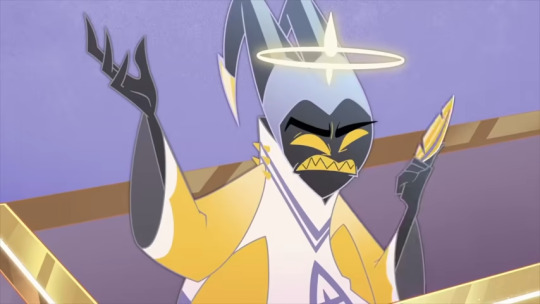
How are the Angels supposed to be corrupt/judgemental/discriminative if they don't even have influence over who gets into heaven? That just brings up the question of how people go to either heaven/hell in general. I always assumed there would be something similar to a court room, where peoples behaviour on earth is judged and where it's then decided, where they deserve to go. This would support the idea of heaven being corrupt if the angels (and only the angels) have super high, potentially homophobic, racist, ableist or sexist standarts and basically have full control over where someone ends up. But the fact that no one knows real criteria for getting there sort of debunks that idea, because if there was a court (or something) they'd know the rules they decide by.
If no angel knows about any criteria, then how are they corrupt opressors, if they aren't even the ones deciding over who gets remorse and who doesn't. At this point, the only bad or corrupt angel there is is Adam (I guess Sera could also count because she is aware of what Adam does) because no regular angel knows the exterminations are even happening. But didn't the show pride itself on being a critique of christianity? Like the whole of christianity? The concept of christianity and problems it leads to in the real world?
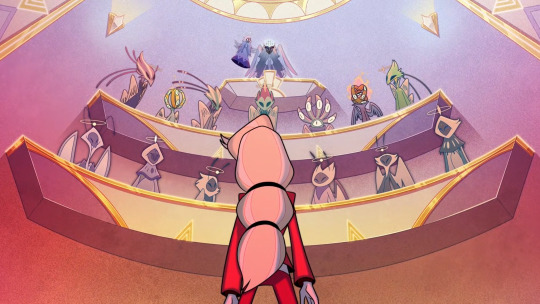
It seems very lazy to basically introduce us to the one (two if you include Sera) actually possibly corrupt character(s) and then introduce a concept that makes every other angel somewhat innocent/reasonable.
They didn't know how they ended up there, all they know is that they were a good person and the show never gives us reason to assume that the angels were in general bad humans, because guess where all the characters end up who are actually corrupt/terrible/evil even. In hell.
Hazbin Hotel wants Adam to be bad by assuming that the people in hell are terrible, which I guess they want to make seem even more unreasonable by making him not know how people end up in hell/heaven. But to be honest, when looking at how hell is introduced by Charlie in the opening song or how the people down there generally seem to act, I would assume hell to be filled with awful people who maybe just deserve death as well. I know it's probably not everybody and just going down there and killing random demons isn't good ofc but the show does such a bad job of supporting the whole "heaven is corrupt" idea.
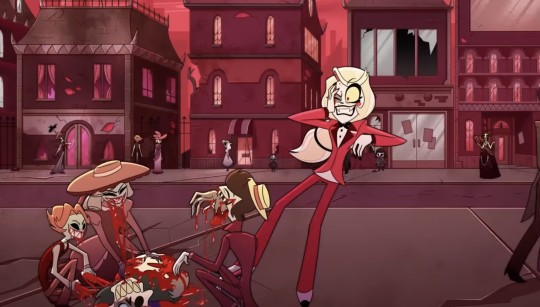
There isn't one demon we've been introduced to that doesn't deserve being down there or that would've gone to heaven would it not be "corrupt".
This might be a little side rant, but the idea of redeeming a sinner is also so underdeveloped. The show never acknowledges what the characters did in the real world even though you'd assume that that plays the biggest role in how they can be redeemed. But just in general, does Charlie even have an idea how to redeem someone? All the "work" she does in HH is just more general trust exercises and very basic ideas of sharing and being kind ig, but what does that even have to do with bettering these people?
For actual, personal betterment she'd need to understand what makes them flawed or bad people and what got them into hell in the first place. A greedy sinner or someone who lied a lot in their real life would probably need to realize why lying is bad and people need to share and then they'd use that new understanding to actually change, which would then lead to them having genuine character development. But how to you redeem someone who did one bad action? Someone who maybe cheated while they were on earth, didn't regret it and now wants to change in hell. You could assume that anyone who was in a relationship before would understand why someone would be mad about cheating but then how do you change them from there to be able to go to heaven? Or, since heaven is pretty "corrupt" it would make sense if they were homophobic. Like, you can assume that anyone who is queer ends up in hell (if the show wants to stick with it's "heaven is bad" idea at that moment), but how do you redeem someone like that? Make them become heterosexual/cisgender? That obviously wouldn't work.
At this point there is not a single idea on how redemption actually functions and none of the characters help us explore that. Sir Pentious' redemption is really rushed and we don't even know what he did to go to hell, so his character arc feels very ingenuine. Angels character development is also hinted at, but is used as an example to show how no sinner just gets into heaven easily (which sorta contradicts Sir Pentious' very rushed and flat/simple redemption). And also, no sinner has ever redeemed themselves ever from what we can assume, before Sir Pentious. Charlie seems like a coward for basing everything she cares for (the survival of "her people") on the concept of something she so obviously doesn't understand/have actually any proof of working out for. And the sinners in hell just really being bad people does not help to make heaven seem unlikable.
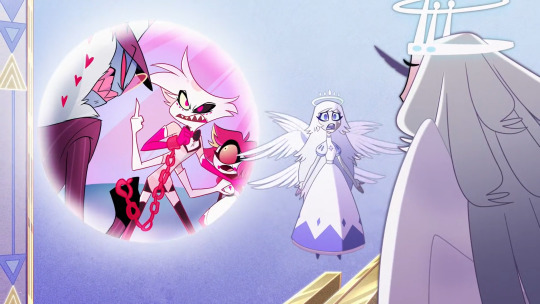
What if Angel Dust wasn't in the mafia or a drug addict and was instead just a regular person who happened to be a sex worker and drag queen. They could've used that to show how discriminative and judgemental heaven is by not allowing him in even though he was a good person.
What if Husk was a regular bartender who just did his job and tried not to cause trouble. But one time, a drunk person tried to abuse someone and Husk hurt him in return. That could show how just one tiny slip up leads to being cast away, even if you were good your entire life (I guess working with alcohol wouldn't work then, but he could also be a cashier or something) or also how it's maybe unfair to judge something done for the protection of others/yourself.
Or Nifty could be a victim of abuse in the real world who was surrounded by people wanting nothing good for her her whole life and this abuse is the reason for her "crazy" attitude in the show. This could support the idea of people being "bad" because of their surroundings, but being judged/mistreated instead of getting support, even when they seek out that support.
None of this happens tho. All of the sinners we encounter deserve to be in hell and they don't generally care to be better. In the pilot (however canon that might still be since Viv can't make up her mind apparently) we see that criminals from our world are in hell as well. Like Jeffrey Dahmer and from that, we can assume just what kind of people go down there (like pretty much every war criminal, dictator, opresser you can think of is probably in hell there, if we are to assume that the earth in HH/HB is supposed to be our earth mostly).
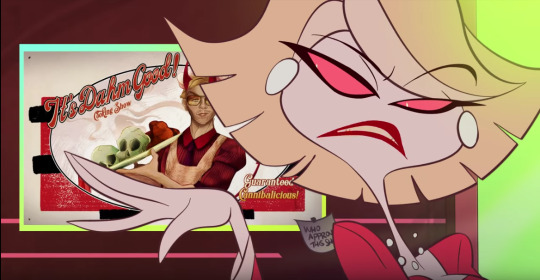
The only demon that doesn't apply to, the only one you could argue is in hell undeservedly is Valeria (and even that is debatable). And Valeria isn't even a demon. She was born in heaven, raised to believe that the sinners are the people she has to kill, without anyone ever giving her a different perspective. She was simply raised to be a killer first and foremost and in the one moment she showed care for a sinner, she was cast out and seemingly left to die.
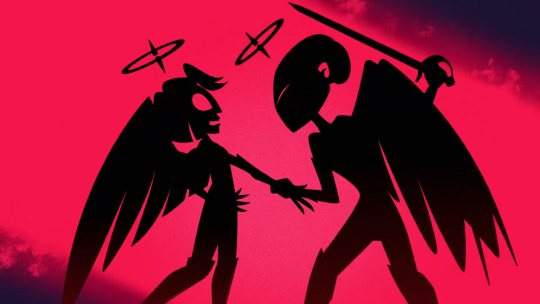
The only "demon" who was actually affected by heaven being "corrupt" (in terms of getting into hell) isn't even a demon, but a heaven born. An ex-exterminator who also killed people. And you know who that also applies to? All of the other exterminators. All of them who are just raised to kill and don't get to ever be anything else mostly, until our "heros" (who are all for supporting moral greyness in another scenario) get to kill them in the finale. Because they are evil and bad and don't have potential to be better which is why Charlie will just let them be killed, even though she is the one who knows best that exterminators can change, because she is literally in a relationship with one.
In that sense Adam really comes across as the only corrupt angel (potentially Sera as well), so it's obviously great that he dies at the end so that now all of the problems with the exterminations are solved. Because it was just this one bad apple (pun intended) there and now that he's gone, all can be well in a world where the angels truly dont seem to be bad in any other way. And doesn't that just sound like a great, interesting, nuanced take on corruption and oppression? I could say some more stuff, but I mostly mentioned everything I could add in other posts already, so I'll just end it here.
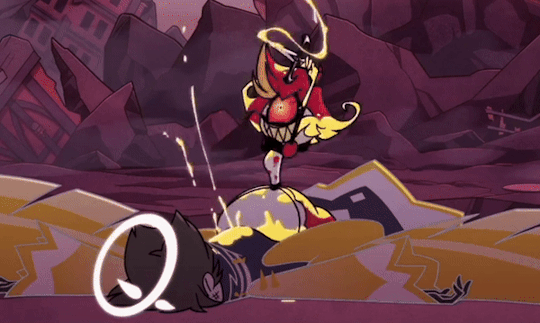
79 notes
·
View notes
Text
I don't know why this feels like such a revelation, but after watching the latest Moffat episode of Doctor Who, it clicked for me that the core difference between RTD and Moffat Who is that to RTD, the Doctor is God (or a metaphorical substitute for God), while Moffat's Doctor is a man in need of God.
Like, it's obvious RTD deifies the Doctor. The imagery is not subtle. And Moffat's Doctor is obviously a much more fallible man. But I hadn't fully considered how this affects the kinds of stories they tell.
In RTD's Who, the Doctor is someone who comes into a mundane human existence and gives it meaning. An encounter with the Doctor changes your life forever. You would follow him to the end of the universe if he asked, because life with him is infinitely better than life without him. Humans who try to reach the Doctor's level are struck down, because mere mortals cannot rise to the level of godhood. From a Christian perspective, this offers valid storytelling possibilities ("Human Nature/The Family of Blood", with its musings upon the Incarnation, fits perfectly in this era), but it does have the Doctor standing in the place of God, which suggests that the universe of RTD's worldview doesn't have one and needs the Doctor to fill that gap.
In Moffat's Who, on the other hand, the Doctor is a wondrous, impossible, legendary being--but still just a man. He can guide you through some of the best or most terrifying moments of your life--but your life has meaning outside of him. His companions learn over and over again the perils of relying on him too completely. Ordinary people can be just as good--or better--than him, because the Doctor is just another man, growing and changing and trying to find his place in the universe.
Moffat's Doctor is extremely aware that he's in a story--and he is not the author. In "The Doctor Dances" he is aware of how death-filled his stories usually are, and is ecstatically grateful when he is permitted a story where everybody lives. In "Blink", he and Sally are both following a script--but neither one of them wrote it; though they have free will, this story came from outside of them. Of course, these are examples of Moffat's meta exploration of storytelling--but the fact remains that his Doctor exists in a world where there is a greater force that runs everything.
And the Doctor resists this. He remains skeptical, arrogant, independent--but he is always searching for something more.
All this crystallized when watching "Boom". There, the Doctor is facing soldiers in a religious war, and he sneers that they didn't notice anything fishy because they "had faith, which keeps you from ever having to think for yourself." Those are the brutal words of every hackneyed internet atheist, and since the soldiers were wrong to have faith in this war, it seems like the story's saying the Doctor's right, and religion's just the "opiate of the masses".
And yet.
The episode ends with the Doctor telling a little girl to hold onto faith, and when the religious character points out that the Doctor was stridently against faith, the Doctor replies, "Just because I don't like it doesn't mean I don't need it."
Isn't that the Christian experience in a nutshell? How many of us are tempted to think that life would be so much easier if we didn't follow God? And yet we can't leave it aside because we need God. We need meaning outside ourselves, and life with God is better than life without him.
But this isn't the Whedon-ish universe where it doesn't matter if it's true so long as believing does something good for you. There is objective truth, and the Doctor is aware of it. He is aware that love is the most powerful force in the universe. (God is love). He is aware that everyone and everything dies, yet knows that something lingers on. (God is stronger than death). The Doctor is in a world where God exists, and even if he (or his writer) doesn't know it, he needs him, is searching for him, and to some extent, believes in him, because he can't deny these truths that he's seen. And I cannot get over how many different ways Moffat has been exploring these themes all these years.
#doctor who#steven moffat#catholic things#i went to that episode hoping to see the usual themes#but i didn't expect to see them escalated to the ultimate extent#i am going to be thinking about that ending scene for the rest of my life#i know i've always said moffat's who is catholic but this is the first time i've thought the doctor could be catholic
106 notes
·
View notes
Text
Demon or Deity? Deciphering Spirits
How to Confirm That You’re Talking to a God or Goddess
You can thank St. Augustine of Hippo for this. In the early 5th century, he wrote a theological essay against Paganism titled, “On the Divination of Demons.”
St. Augustine’s mother was Christian, and his father was Pagan. He understood both sides. He wrote many philosophical arguments for Christianity, his largest being The City of God.
In "On the Divination of Demons," Augustine fought back against an Oracle predicting the invasion of Serapis's temple. He argued that demons spoke to this Oracle. He argued that All Pagan Gods are Demons in disguise. He ridiculed fortune tellers and future predictions comparing them to the circus.
Do the arguments hold some sort of validity?
While Spirits can impersonate Deities this guy can now be pushed away from the conversation.
I’ll ask that question again.
Can Spirits Impersonate Deities?
The short answer is Yes.
The long answer depends on your experience level and knowledge.
If you are not used to the deity’s signs and how they communicate or you do not know which red flags to look out for, you are prone to deceit.
Red Flags
Messages drastically change.
For example, recently you received a sign from the Goddess Hekate. She wants to work with you.
The next week, another message tells you that She does not like you. Deities rarely change their mind without good reason. Double-check the divination.
People do everything for you.
Deities do not need to go through others to speak to you. Even if you cannot hear Them directly, deities can contact you in different ways. If someone else does a reading that sounds completely different, question it. Especially if it’s random and not requested. Do not use other people to translate things for you all the time. Spiritual journeys are personal. They are meant for you, and a lot of people get hurt this way. Other individuals love taking advantage of people using them for their own motives. Just be careful out there.
Overly negative or apocalyptic.
I've heard an unfortunate amount of people claim that the world was going to end after contacting their spirits. Why would they let go of any worshippers telling them that? Why would they give someone a sense that they are the chosen one? Question that. No one is special. We are all here for the human experience. Try dealing with that first even if you don’t want to.
The entity is trying to force you into things.
You do not need to answer spirits. A deity could ask you to worship Them. You can also say no. With years of experience, I have never heard of a deity punishing someone for not working with Them. If a message sounds like a threat, then question everything, and it’s probably best to ignore it.
How to Guarantee That You’re Speaking to a Deity
Ask the same question several times.
Use your preferred divination technique writing down all the answers to your questions. After one day has passed, repeat the same method rephrasing the questions asking the spirit again. Sometimes there are inconsistencies. Question what feels right and what does not.
Thoughts belong to whom?
Are the thoughts yours or are the thoughts external from you? Sometimes strong emotions are mistaken for spiritual signs. It’s easy to get caught up in your own head and let it take over hijacking the metaphysical exercise. Always question this. Did you anticipate a specific answer? This can also lead to derailment. It doesn’t hurt to ask again to gain confirmation. Before contacting your deity, stabilize your emotional state.
Gathering valuable resources.
Contrary to what I just said you can seek outside opinions for valuable resources. Become familiar with the deity’s information beforehand and ask about other peoples’ experiences. Just don’t let people take over the work or tell you how to think. Try to do the work yourself. Research is key.
Different techniques for you.
Try a different form of divination to see if the answers are around the same or greatly vary. This won’t hurt and it will help you learn more. Trust your instincts in spirit work. It’s okay to question things.
Protection orders.
If there is constant anxiety and worry, then do yourself the favor and put-up protection wards before spiritual communications begin. It will give you some peace of mind and it doesn’t hurt anything at all.
#energy work#energy manipulation#witch#pagan#witch tips#witchblr#witchcraft#pagan witch#spirit work#witch community#beginner witch#baby witch#metaphysics#metaphysical#witch stuff#witches#witches of tumblr#pagan blog#paganblr#pagans of tumblr#paganism#divination#spiritualism#spirituality#spiritual#spiritualgrowth#spiritual disciplines#spirits#deity#deity work
92 notes
·
View notes
Note
Maybe I should be asking an Orthodox person this, but I do not understand the hubbub with the Filioque. To me it is hair splitting, could you explain why it would not be hairsplitting? Or if there is an aspect I am missing as to why it was the final straw for a schism?
Okay, ah, I think there are two aspects that need to be addressed here. The first deals with the simple fact of its inclusion in the Creed, and I'm going to come off as a traitor here, so let me clarify my personal position; I believe the filioque best represents the reality of the Spirit's procession, but I think it was bad that the Western Church inserted it into the Nicene Creed.
As Henri de Lubac talks about in The Christian Faith, the Church allows for many theologies, spiritualities, customs, and liturgical traditions to coexist; "from one country to another and from one century to another there are many differences in emphasis." What connects all these elaborations and practices of the Christian faith is that they are all anchored in that faith, as revealed by God and distilled in the Creed. That faith is the unity of all Christians everywhere.
And what convinced me that the inclusion of the filioque was not a good move actually came from another Catholic thinker, Karl Rahner, who wrote "the inevitable pluralism met with in theology cannot and must not cause the unity of the creed of faith to disappear from the Church, even in its verbal expression." Except.... that's exactly what the Western Church did. It took the Creed as articulated by two separate ecumenical councils, and unilaterally added words to it. And while there are historical reasons for that inclusion, and while I think the theology behind its inclusion is true, I think modifying what was meant to be the unifying symbol of the Christian faith was not a good move. And I can see why the filioque inclusion seems like a rupture from the Orthodox tradition. Because... we have caused the unity of the creed of faith in its verbal expression to disappear.
And I think that's a bigger problem than the content of the filioque clause itself, to be honest. But, as far as the content goes, let's talk about that, too.
In the Orthodox perspective, the three Persons of the Trinity share a common nature, and there's a kind of symmetry where the traits of any given Person is either held in common by all three, or is reserved for one of Them. So, for example, the state of being uncreated and eternal are traits shared by all Persons in the Trinity, as is the fact that They are almighty and infinite. Those are traits derived from their divine nature. But in terms of traits distinctive to Their individual Personhoods, well: the Father is seen as the Source of the other two, while the Son is the only begotten Member of the Trinity, and the Spirit is the only spirated Member. An Orthodox Christian may argue that the filioque ruins this symmetry of Persons; if the Spirit proceeds from the Father and the Son, the distribution of Personal traits is no longer equal (two Persons have a trait that one Person does not have). This can be seen as a kind of ontological inferiority on the Spirit's end.
From the perspective of the Roman Church and Her western descendants, the articulation of the Trinity doesn't really involve this "common to All or particular to One" logic. Instead, we tend to use a sacramental logic that assumes that how the Persons of the Trinity operate within Their creation also tells us something about how They relate to each other from all eternity. So, the Father sends the Son into the world (John 17:1-4); hence the Father begets the Son. But the Father sends the Holy Spirit to the disciples "in [Christ's] name" (John 14:16-17, 26). So, the Father sends the Spirit, but the Son is somehow involved. The Holy Spirit is believed to still have one origin, but this one origin is the joint act of Father and Son. Part of this may have to do with different starting assumptions. Eastern Christians tend to start their thinking on the Trinity as Three existing in Unity, while Western Christians tend to start their thinking on the Trinity with One existing in Multiplicity.
But this is a super complicated subject, so if someone wants to correct me about either of the perspectives I tried to lay out, please feel free to do so.
#asks#Christianity#Catholicism#Orthodox Christianity#Holy Trinity#God#God the Father#Logos#Holy Spirit#Karl Rahner#Henri de Lubac#Creed
28 notes
·
View notes
Text
The risk of mysticism
The reason most people have trouble reaching the Gods is because they do not consider that whatever trouble they are having is a direct reason to what they feel that they are risking as a response.
For example, if you think yourself unworthy of Them or constantly worry that They are mad at you, it is more likely than not that you have an underlying trauma that has led to people pleasing. Deal with that first because the Gods aren’t going to make that go away - They will probably make it worse, actually.
Any issue you have in any other relationship be it with friends, relatives, lovers, you name it - the Gods will magnify those issues tenfold just by existing.
Another good example is if you are upset because you cannot hear Them clearly, consider that you have not been close enough to Them yet. And if you aren’t close enough, what can you do to make it better?
It’s not that you’re not doing enough or that you have failed. It’s because you aren’t aware enough of yourself to even begin to understand the nuance of what the Divine can offer.
The problem with people on social media who think it is a cakewalk to have a relationship with a Deity tend to steer those people who have just started out towards failure. It isn’t easy to do this - it takes work and inner reflection and dedication. You don’t go into this and think you have a right to a relationship with a God and it should just be given to you because you exist. That idea came from Christianity.
The Gods are not all-loving, omnipresent and omnibenevolent. Not all of Them even work with humans. And not all of Them care enough to go out of Their way to prove to you that They are real unless you put in your side of the effort to encourage Them to come to you. People who have 5-10 Deities they think are following them around all day don’t actually have 5-10 Deities - they are lucky if they have one.
Otherwise, if you’re okay with just giving offerings and seeing the Gods as a symbol rather than a real, living being who has needs and wants, then by all means. It just isn’t going to get you any closer to Them and a lot of people I see tend to assume They aren’t real enough of an authority to care either way.
To be clear, this is no fault of any person. This is the fault of a society that has failed in giving us a culture that allows the relevance of the Gods in ordinary to flourish.
What people don’t understand is that by walking a mystical path, you are already not going to abide by the standards of the religions that are most practiced in the modern world. What you do is not going to be what Christians or monks or nuns or priests do - it is going to be new and it is going to take effort to forge a new path into the future of paganism.
It won’t be completely from scratch but it’s also not going to have much of anything to do with Christianity no matter how much you love to hate Christians. It won’t have much to do with mainstream society at all, actually. The reality of mysticism is actually not terribly popular at all.
The people who walked closely with the gods and heard Them and felt Them always in ancient times existed outside of what was widely agreed upon to be society. It is otherwise not normal to be as close to the Gods in the way modern polytheists seem to think it should be or think it’s something everyone else is capable of doing while very few are willing to make that kind of sacrifice or risk being wrong long enough to successfully gain traction.
At the end of the day, it’s not a highly probable thing that 99.99% of people on the internet that newer people or even aged pagans compare themselves to actually have done the work to be able to claim the relationship that they believe they have with the Gods.
#polytheist#deity work#paganblr#devotional polytheism#mysticism#deity worship#norse paganism#norse gods#norse polytheism#lokean#pagan blog#polytheism#pagan resources
19 notes
·
View notes
Note
I know you're christian so if it's okay to ask:
What christian themes do you like being explored in media?
What conversations between different aspects of christianity do you wanna see portrayed?
Do you enjoy Jesus-like characters?
Are there any movies, shows, or books that reflect or represent your values and faith?
Hi Gloomybadger!
I don't mind being asked about my religion.
1.I really enjoy the themes of forgiveness being explored. The good example is Iroh and Zuko from ATLA which mirrors the Prodigal Son parable perfectly. I also love watching the trope of the power of love overcoming death.
Forgot to mention the Salvation/Redemption troupe like with Viren in The Dragon Prince. I enjoyed watching his slow redemption arc as he eventually broke free from Aaravos and found peace at the end. (Hopefully Claudia too if we get that next saga.)
2.I want to see Spiritual Warfare more in media, not just priests exorcising a demon. There are different ways to do it in the different dominations of Christianity, but the mainstream media only really shows the Catholic version.
3.I don't mind Christ-like characters as long as they are respectful. Superman is a good example. He is from the house of El, which is another name for God in the Bible. He's very powerful but humbles himself and protects those weaker than him. I also appreciate they gave Superman a weakness in Kryptonite because only Jesus is all powerful. I also love Aslan from Narnia who is literally Lion Jesus. The metaphors are beautiful.
However, I don't like it when media make characters Christ-like in blasphemous ways like Viktor from Arcane season 2. He was modeled differently in the games, using his inventions to heal people instead of his mystical powers, so the writers portrayed it like this purely for aesthetics. Then they had Viktor form a cult that destroyed the world. Very disrespectful. They wouldn't have portrayed that with a Buddha or Muhammad figure, so they shouldn't with Christ either. (But Hollywood's double standard when it comes to Christianity is a whole other can of worms.)
4.The Chronicles of Narina is an excellent source. Also Iroh and Zuko's journey in ATLA. The show is heavily inspired by Eastern religions, but it also has some Christian values it displays well. And I love how Nightcrawler, a canonical priest, is portrayed in X-men 97.
Thanks for the ask!
#mutuals#answered asks#christianity#Christianity in media#atla#arcane#arcane critical#dc#superman#the chronicles of narnia#x men 97#nightcrawler#nightcrawler xmen 97#tdp#tdp viren
16 notes
·
View notes